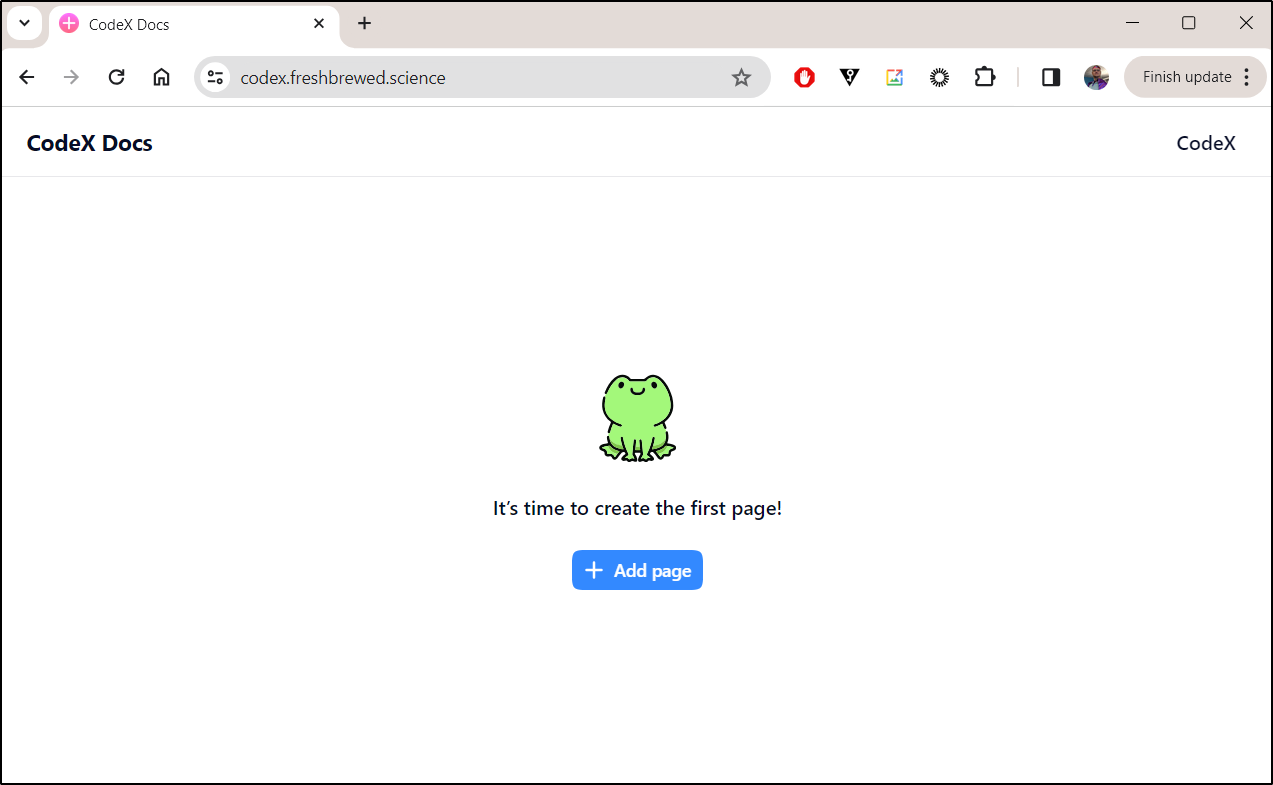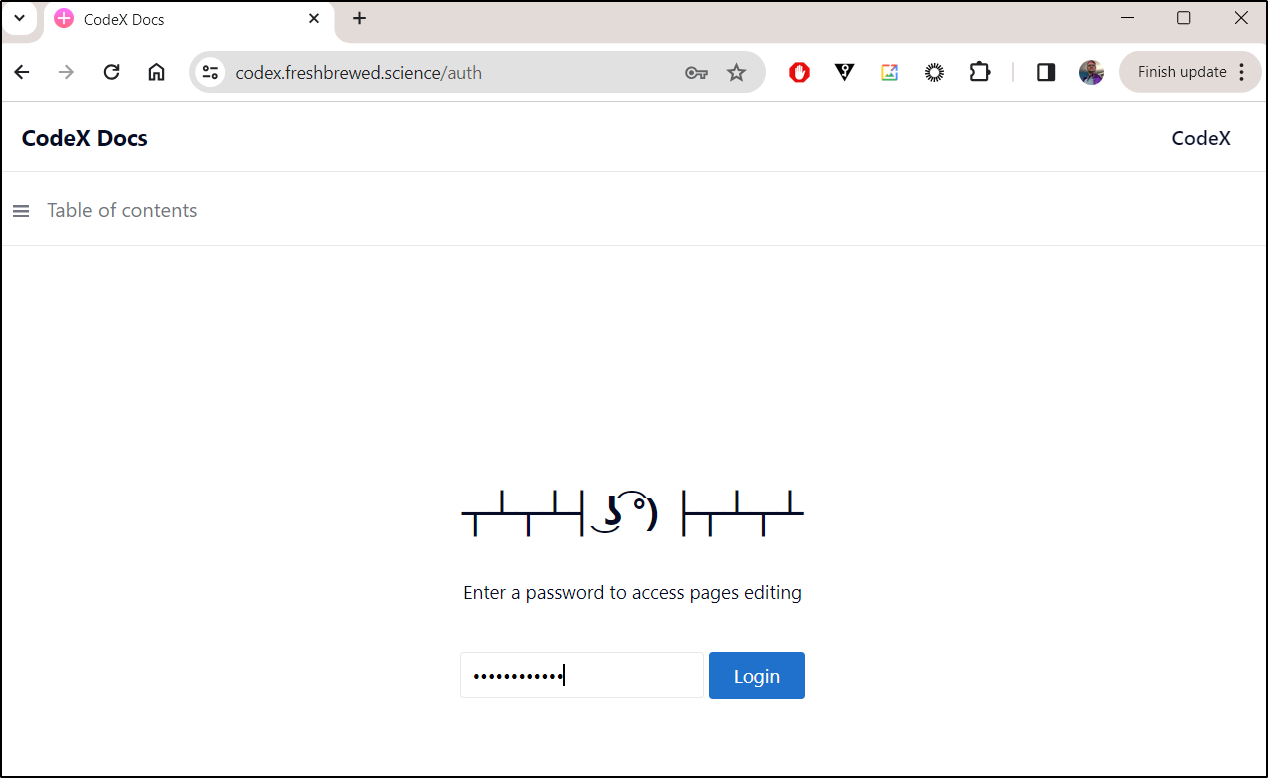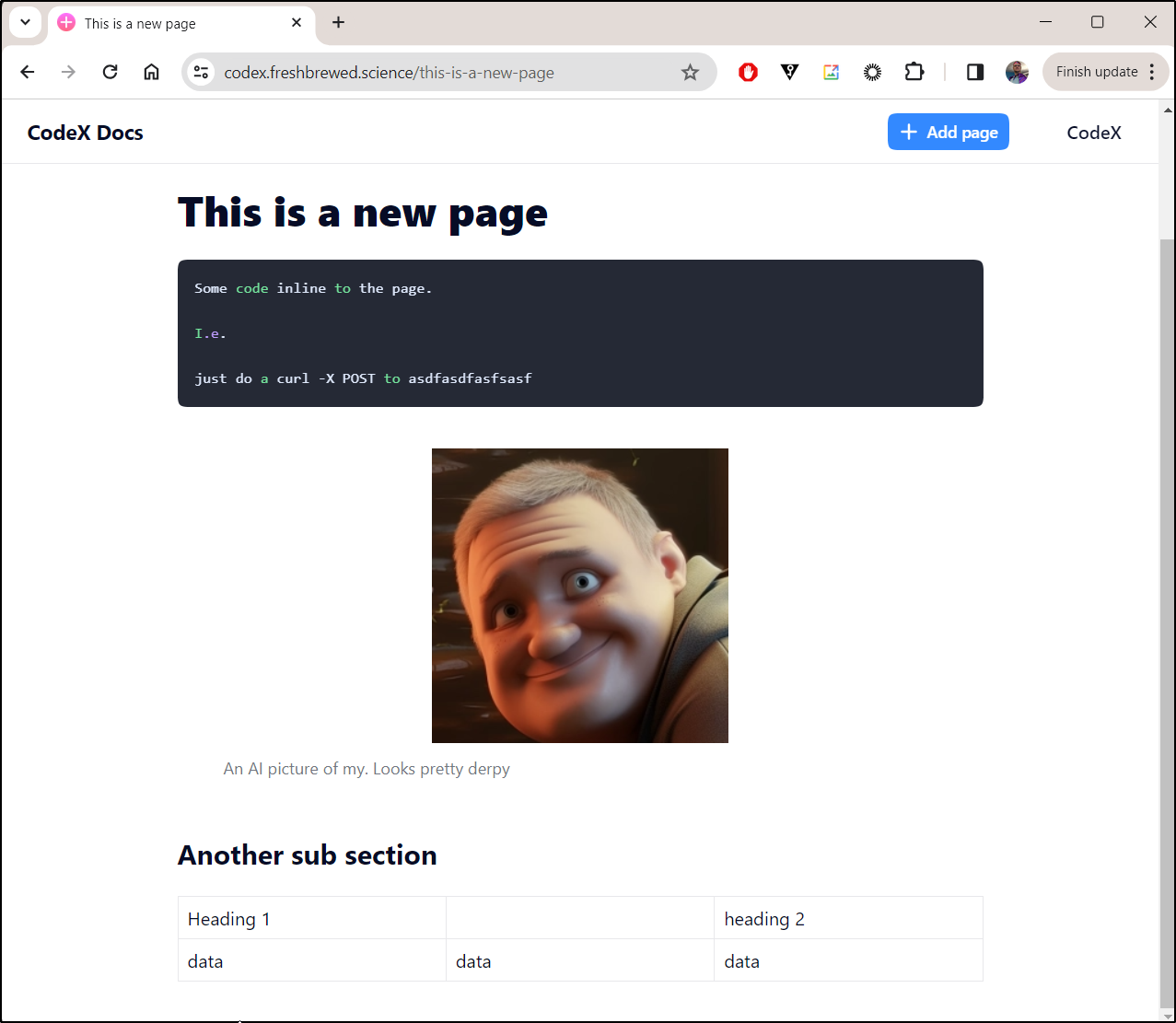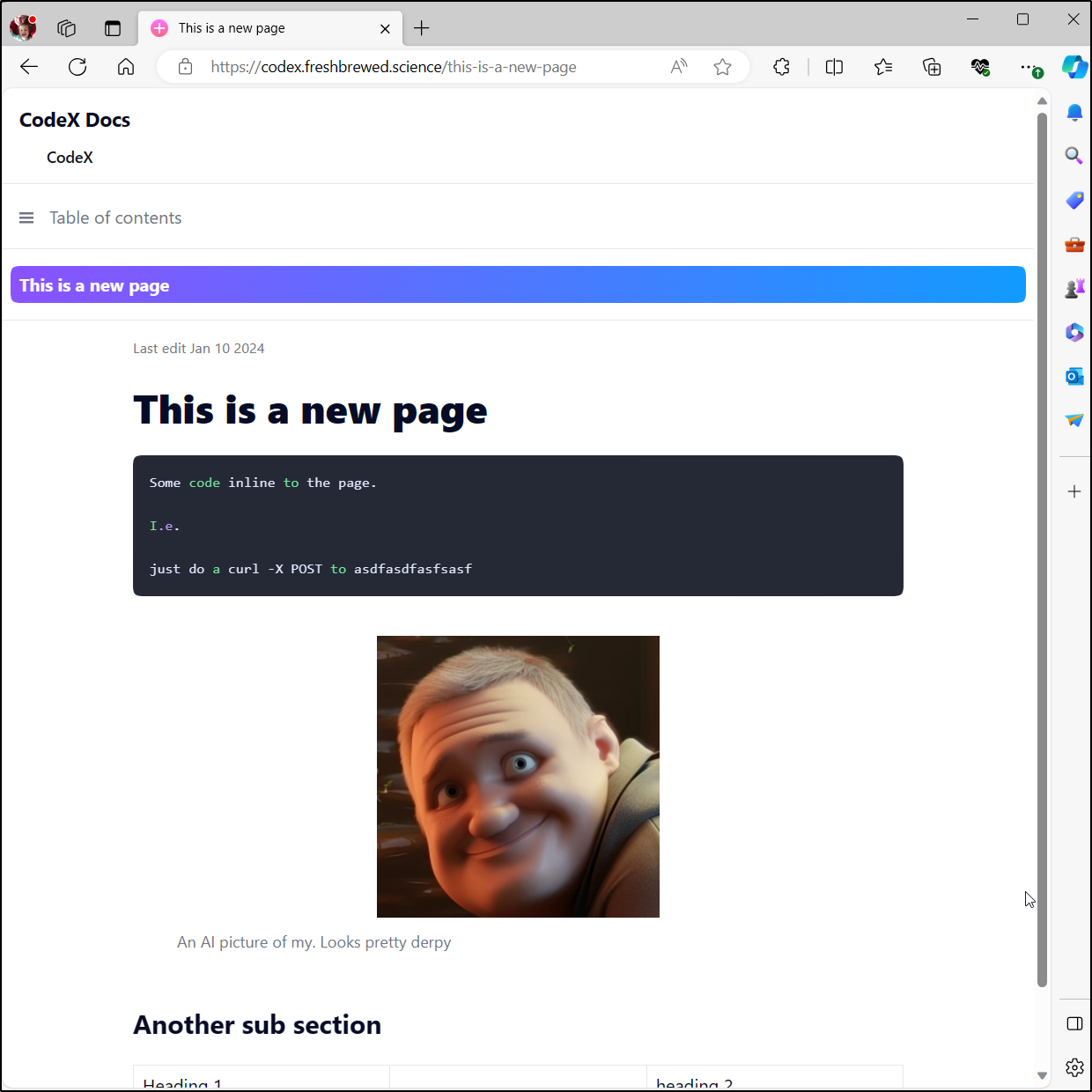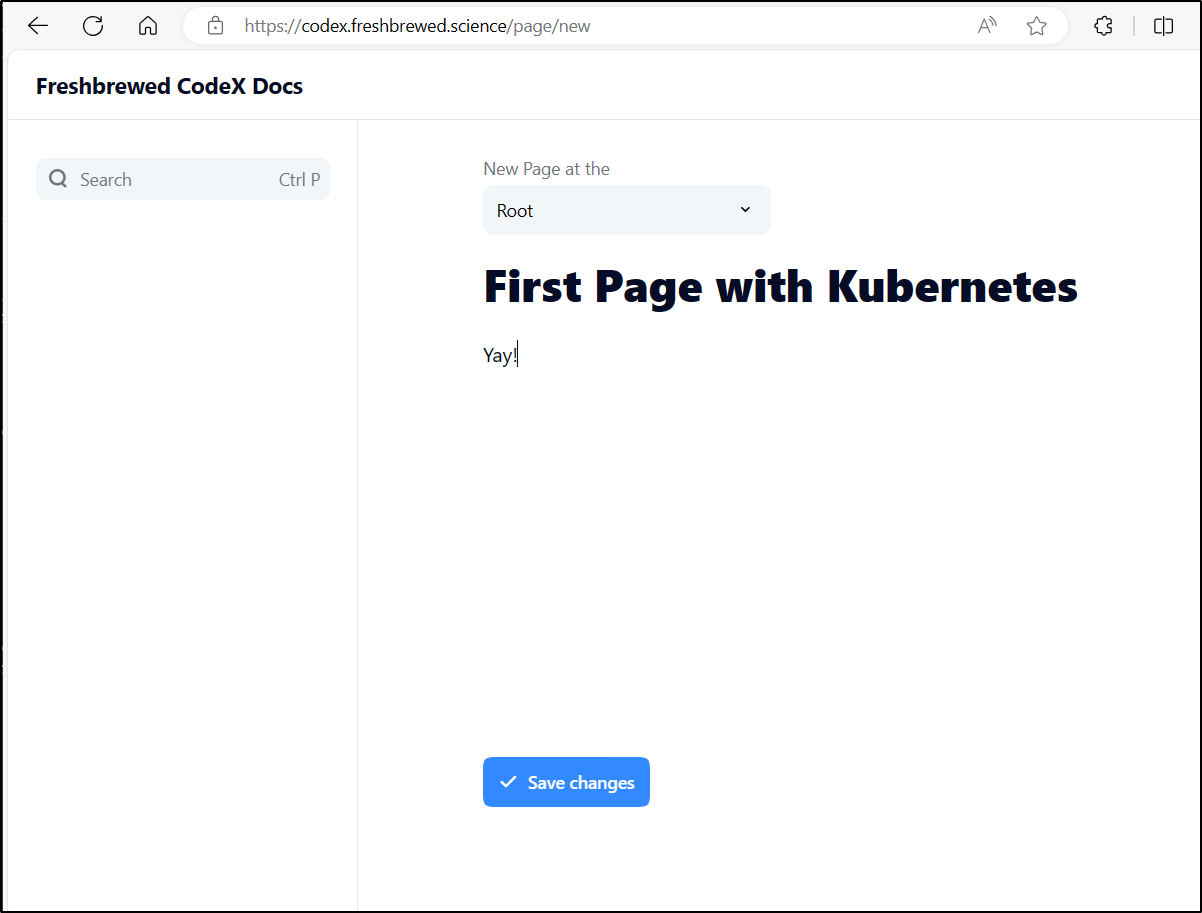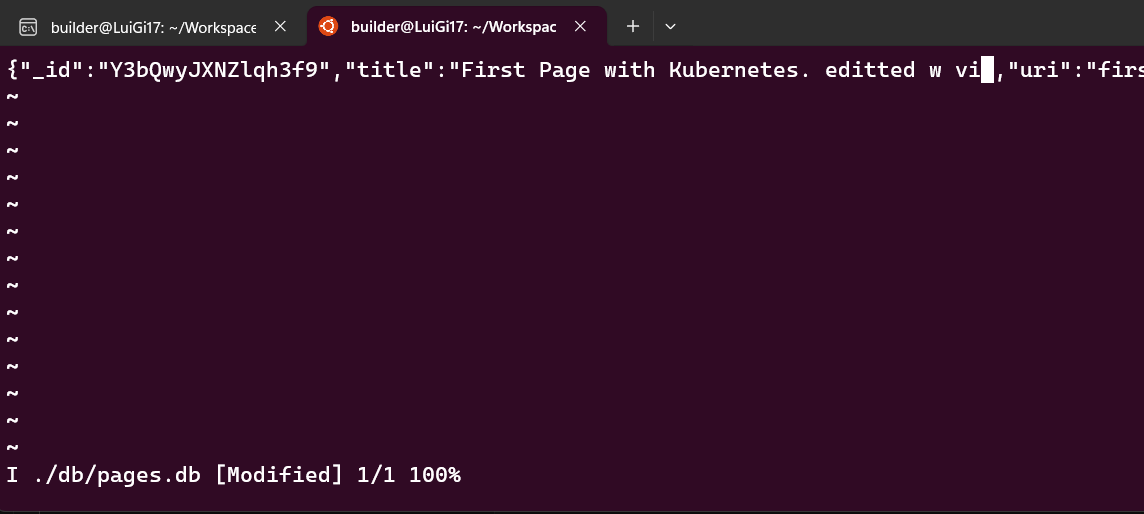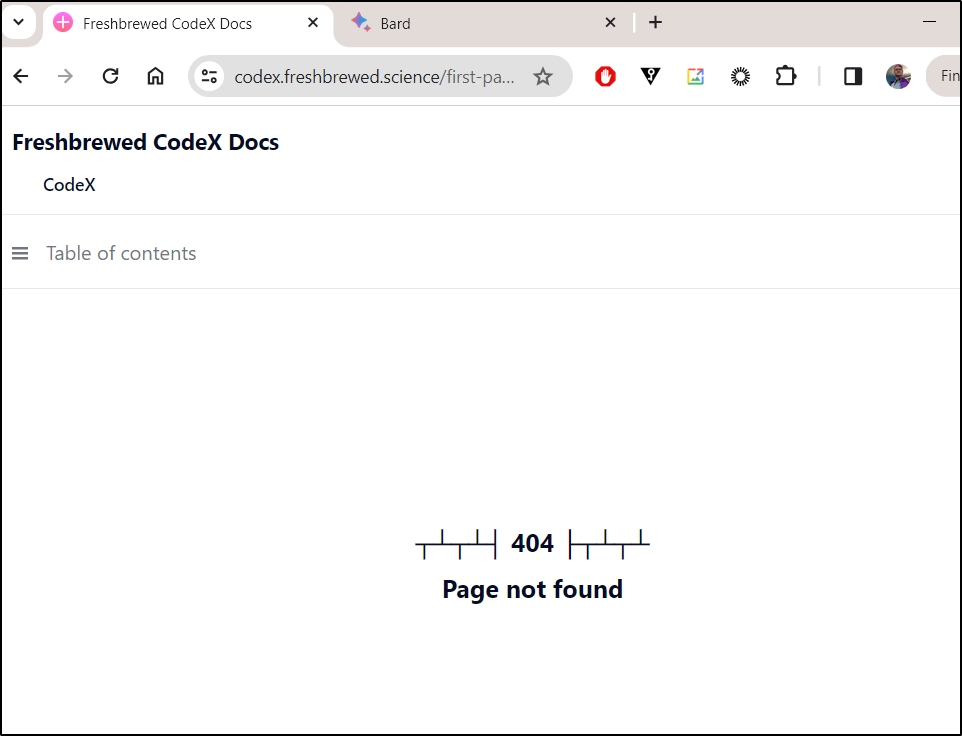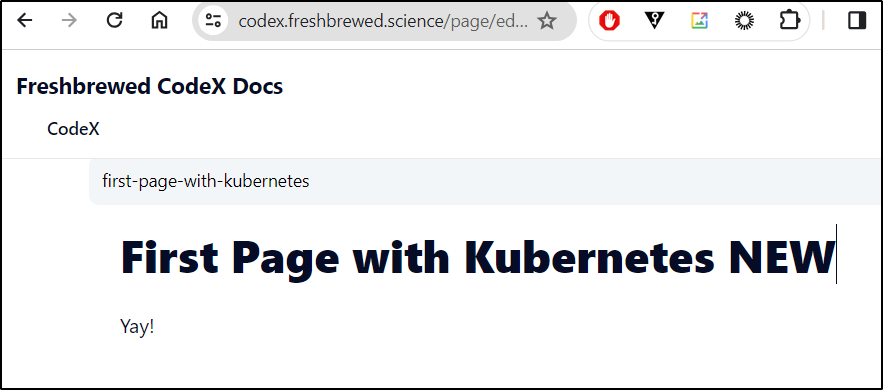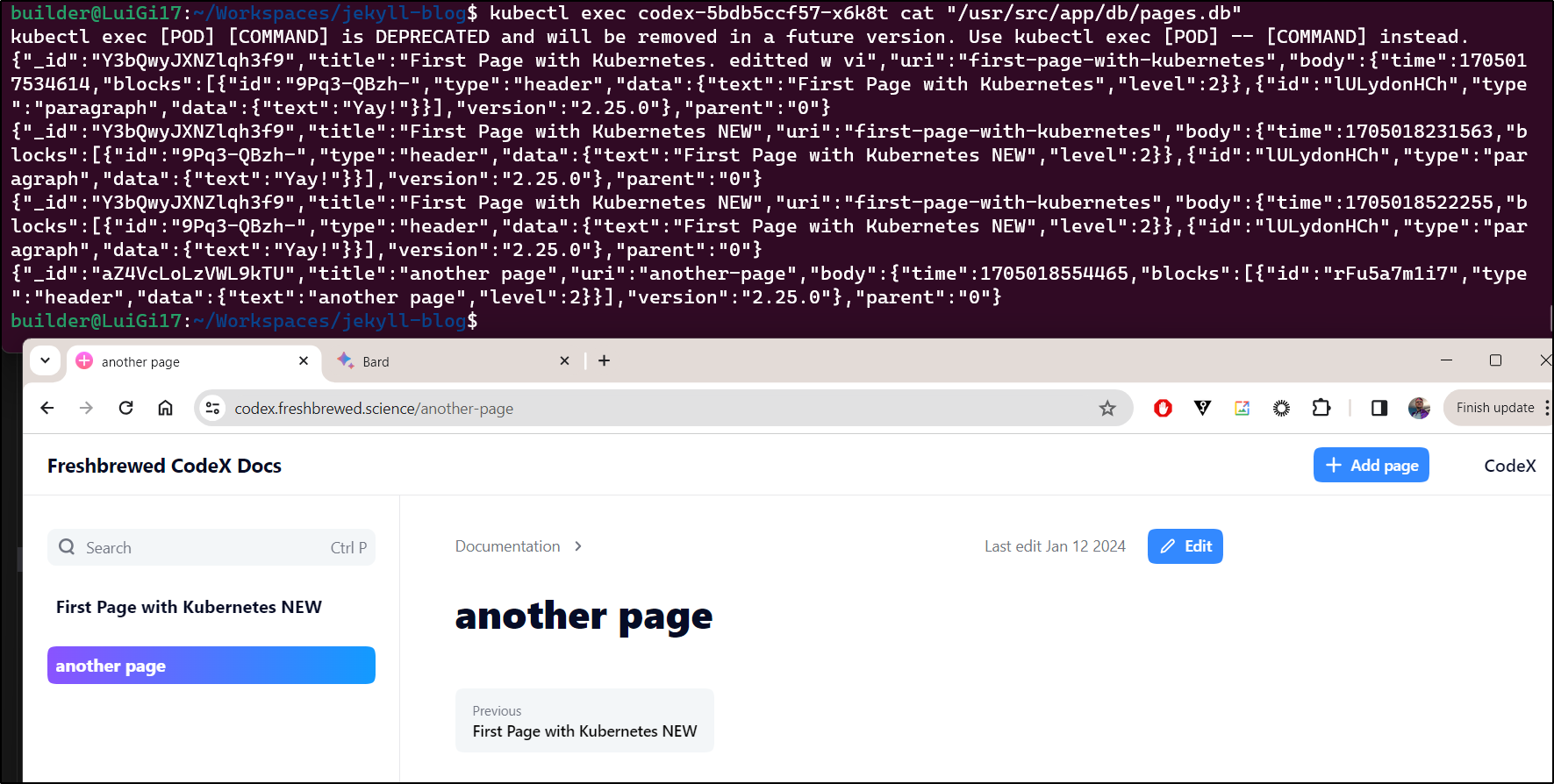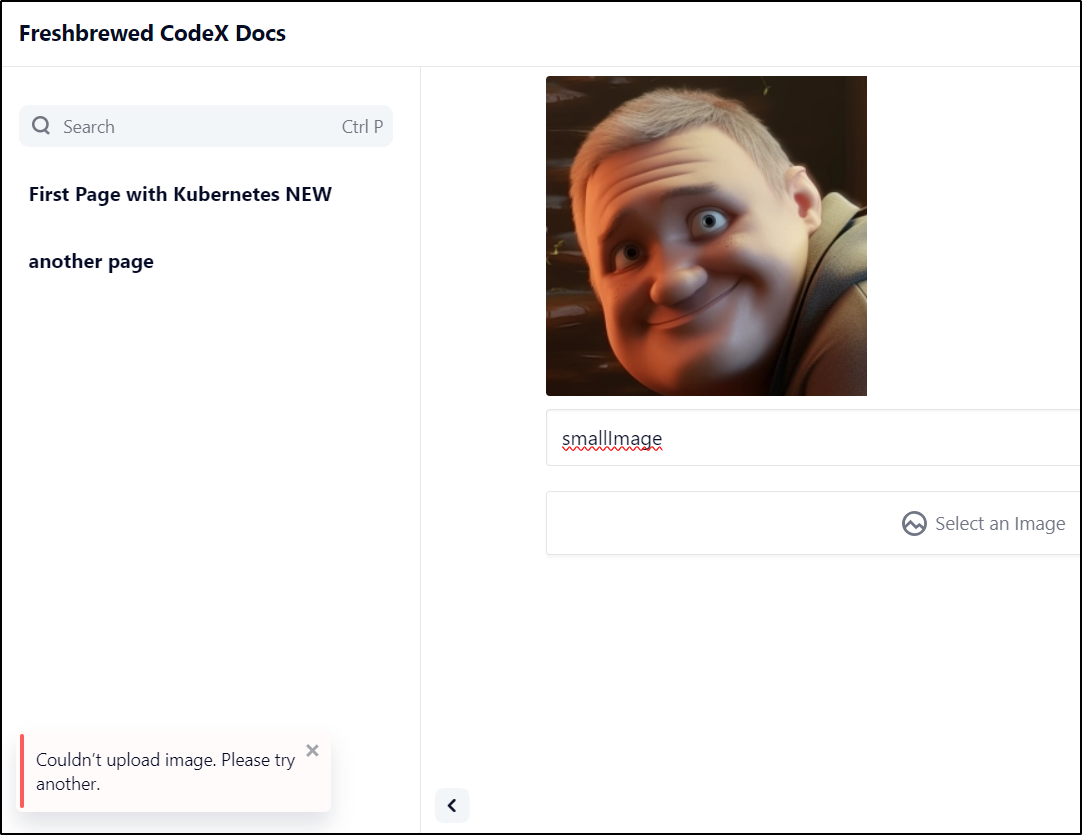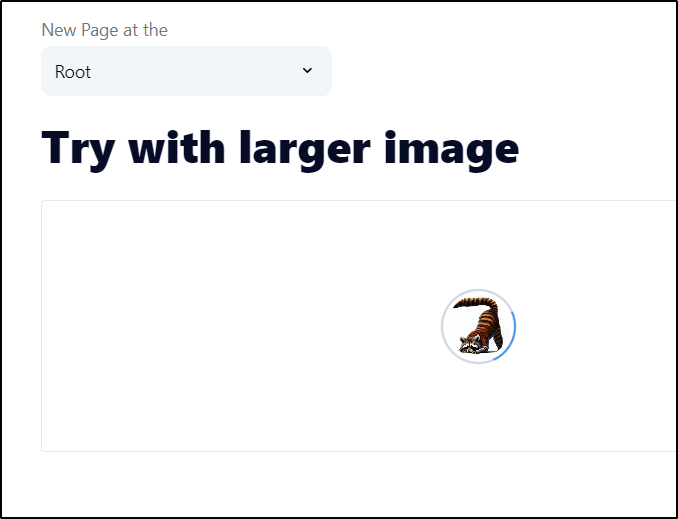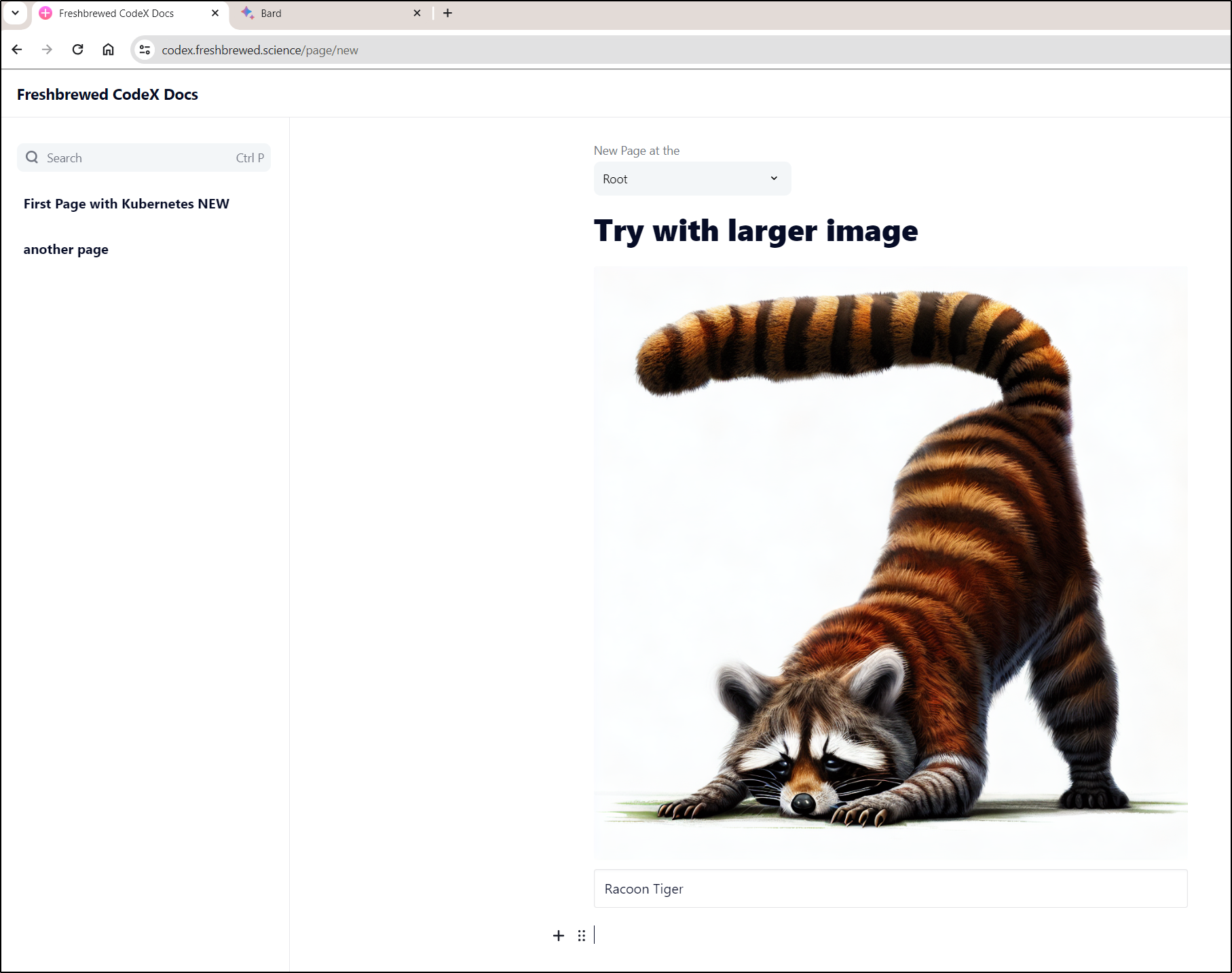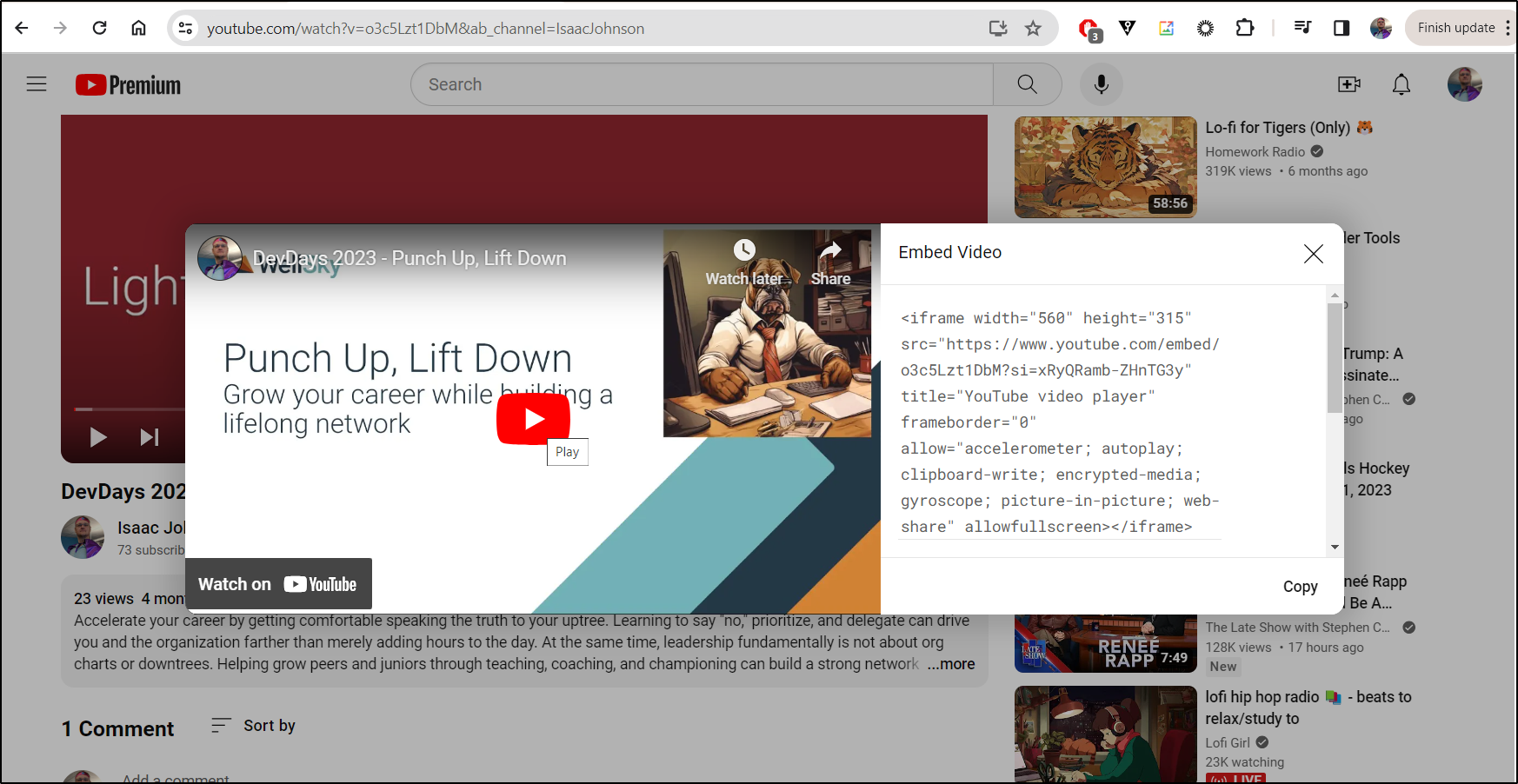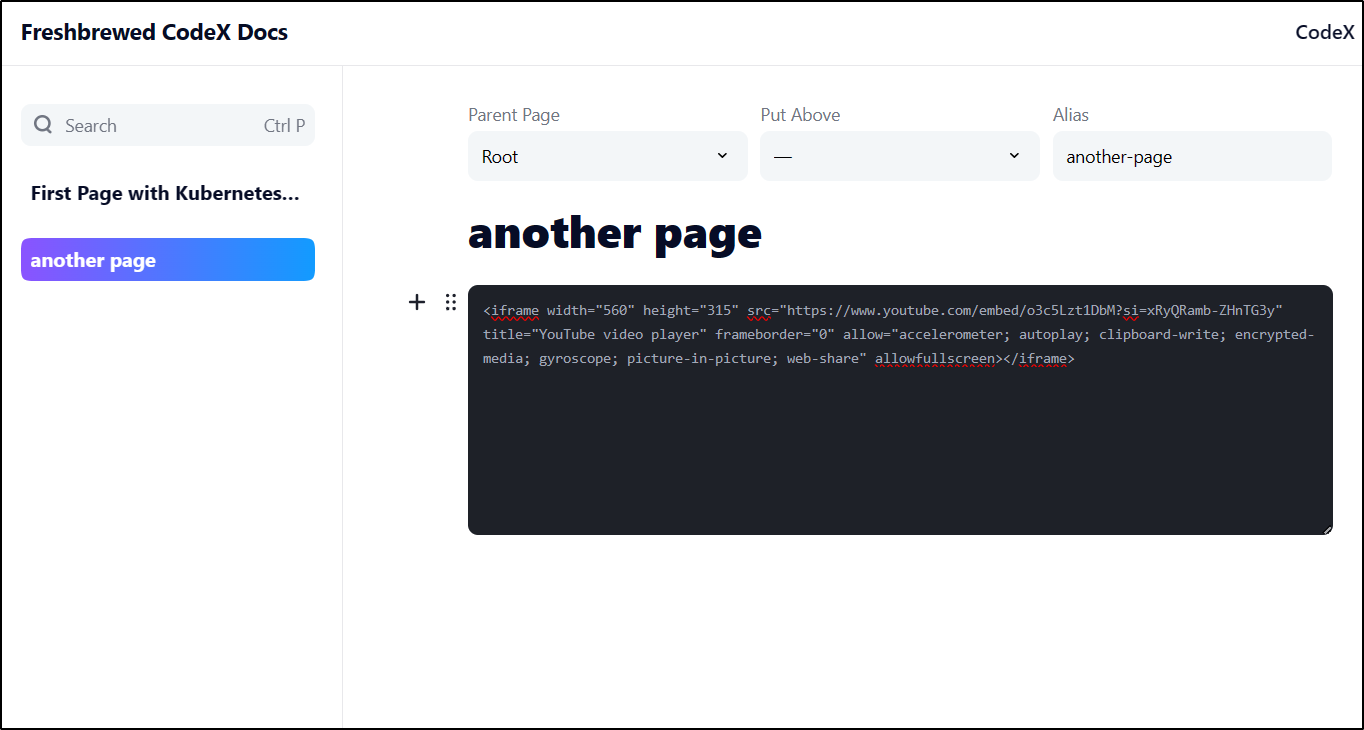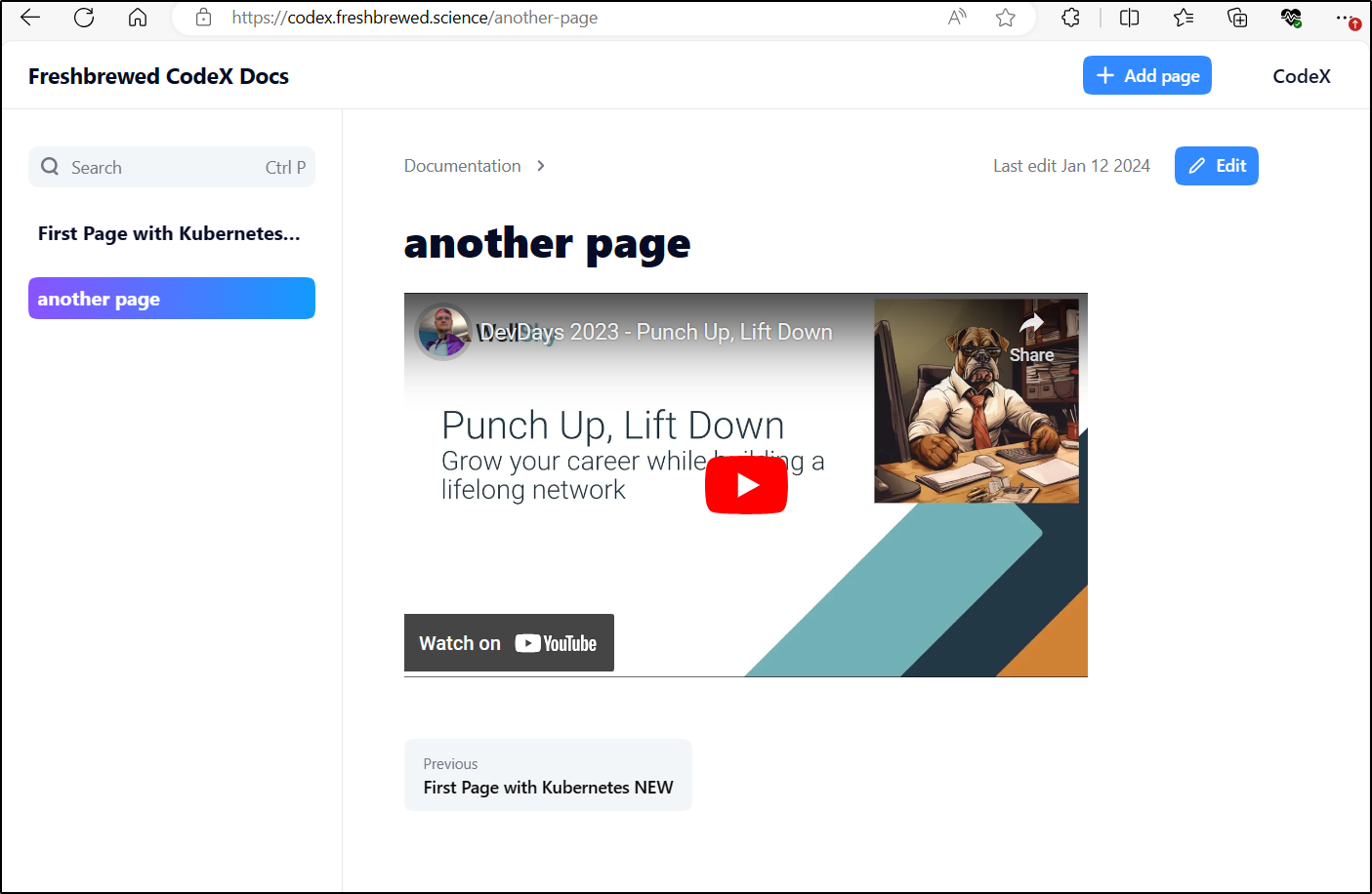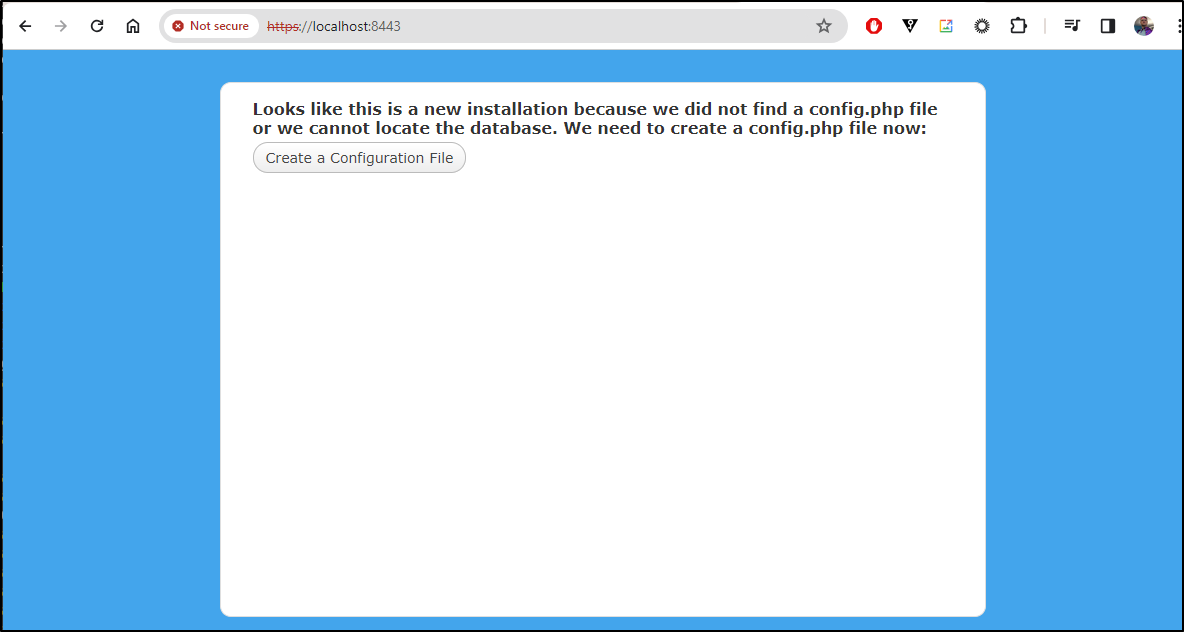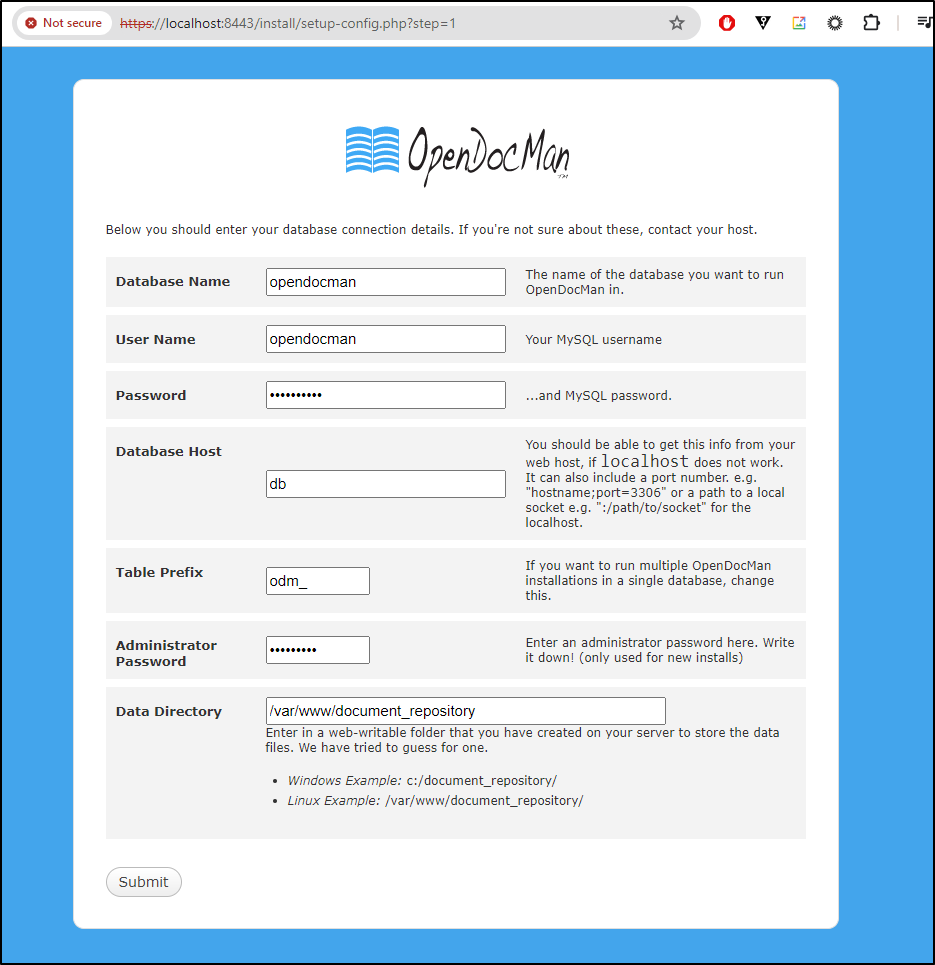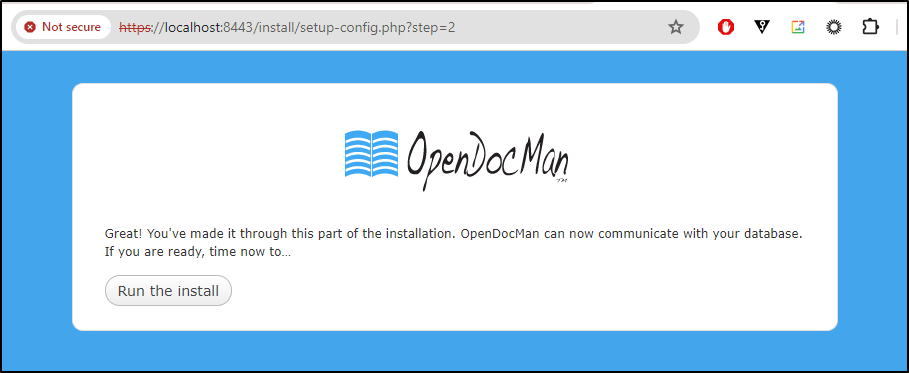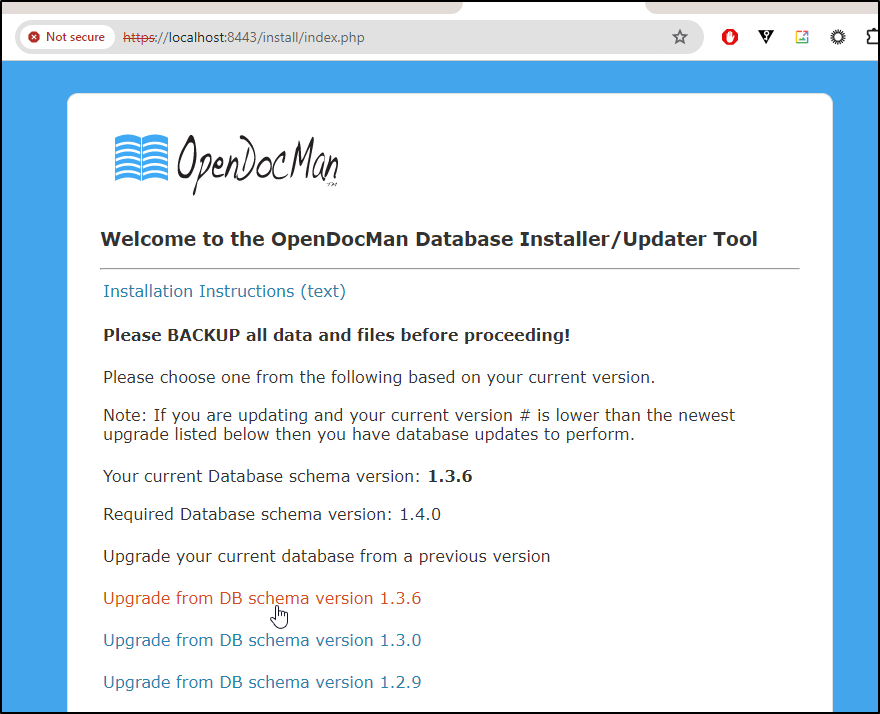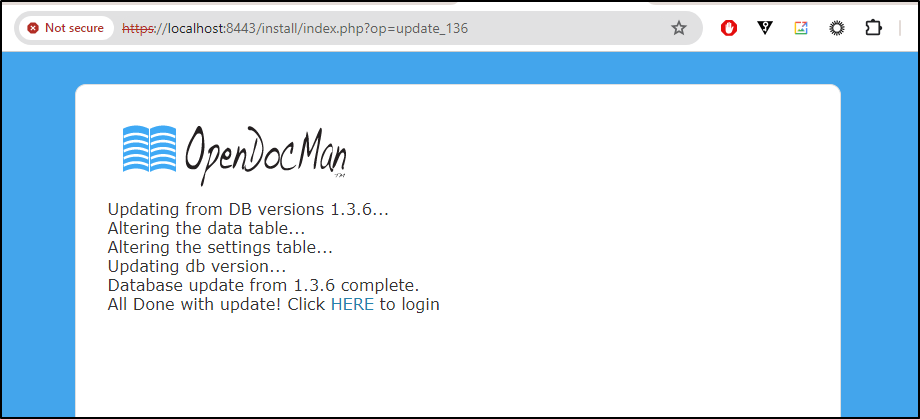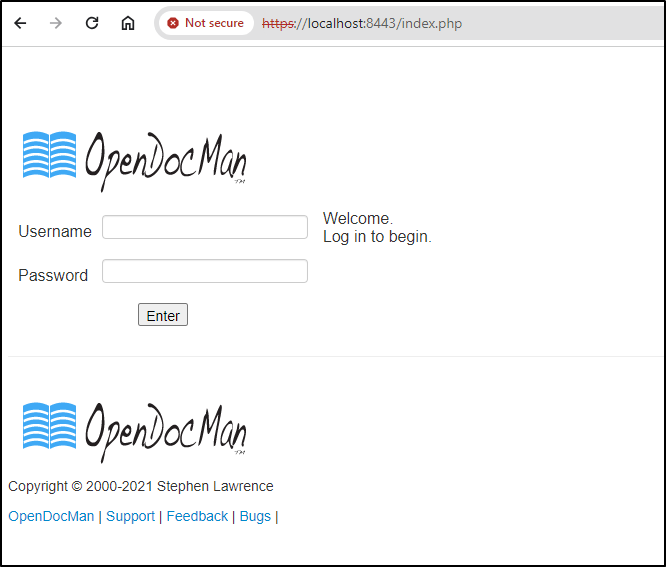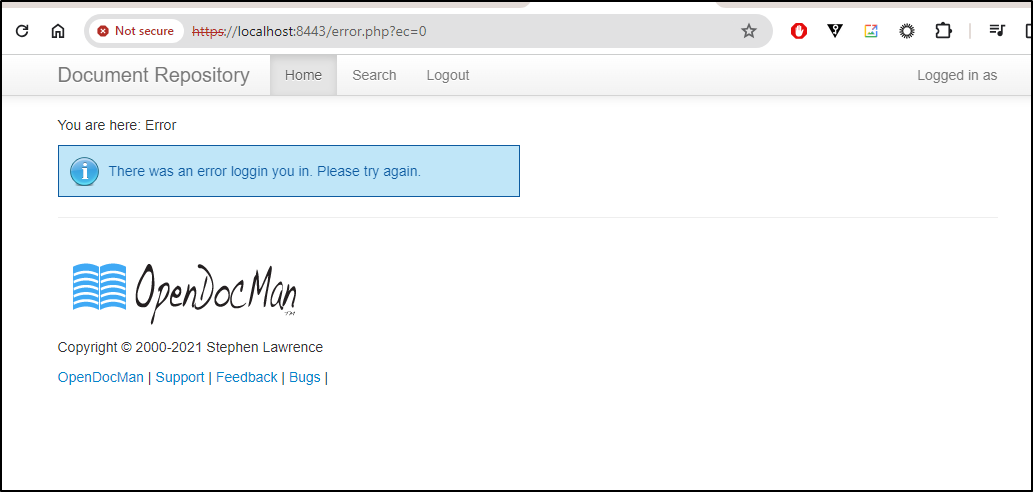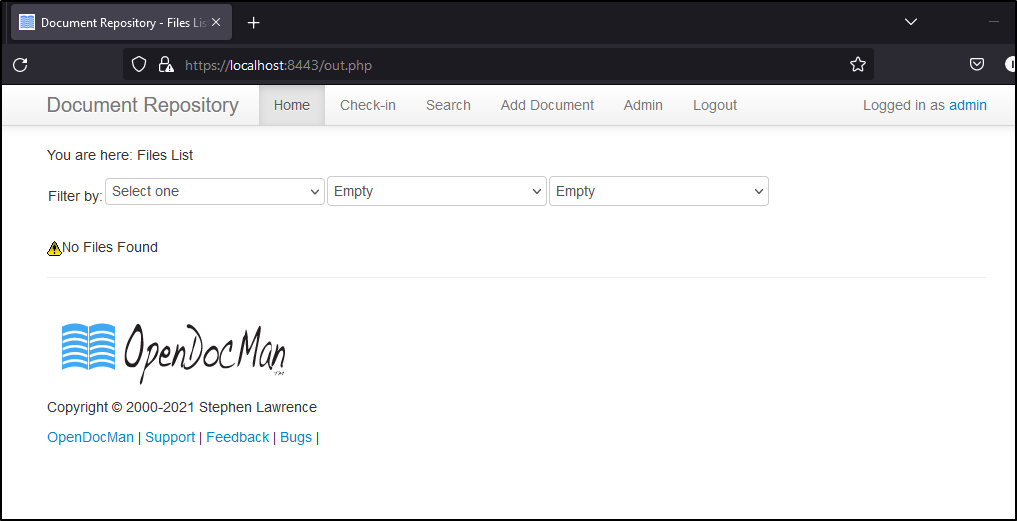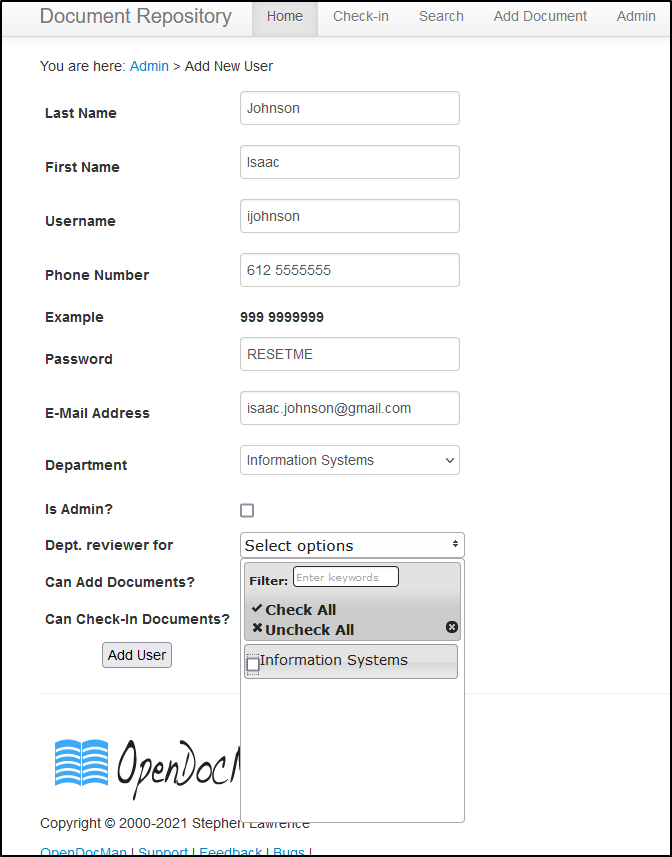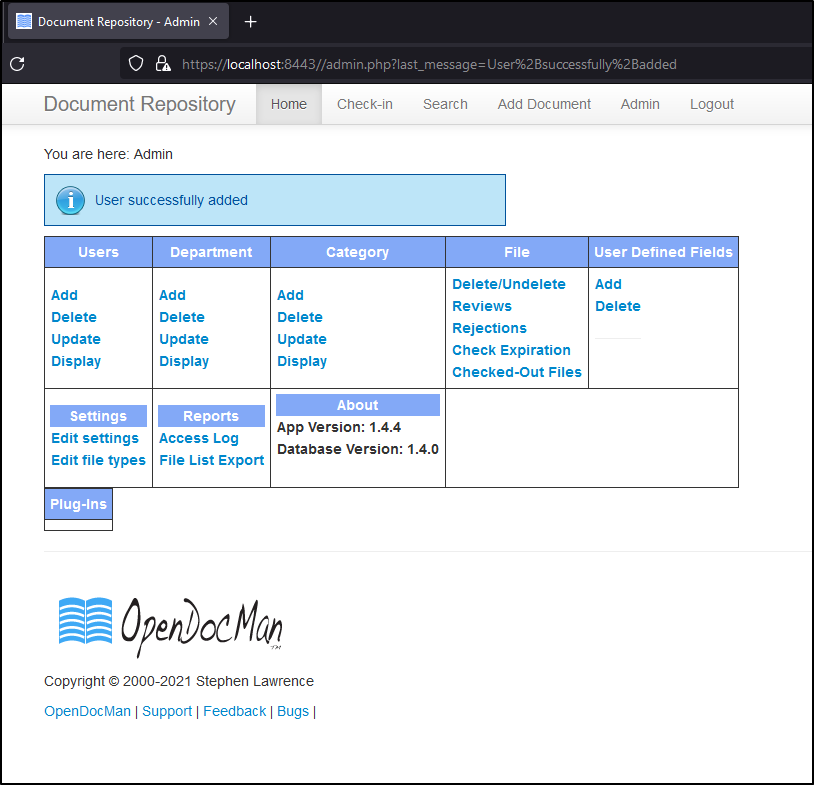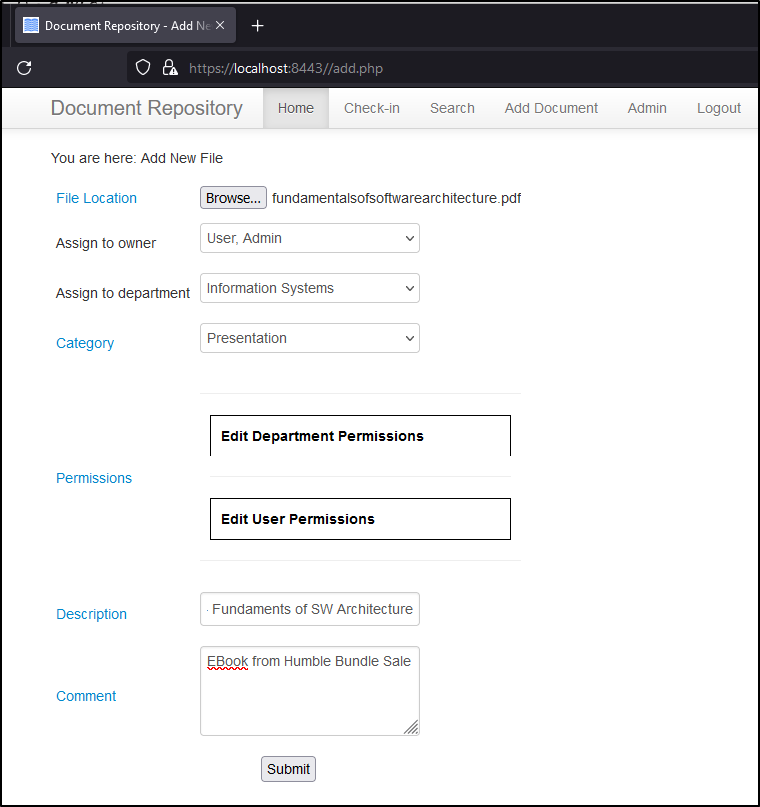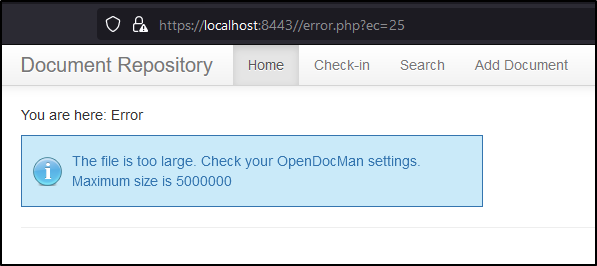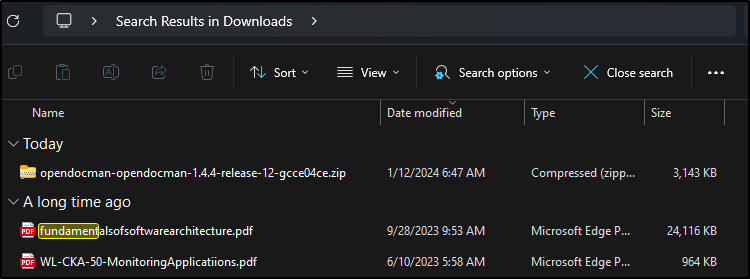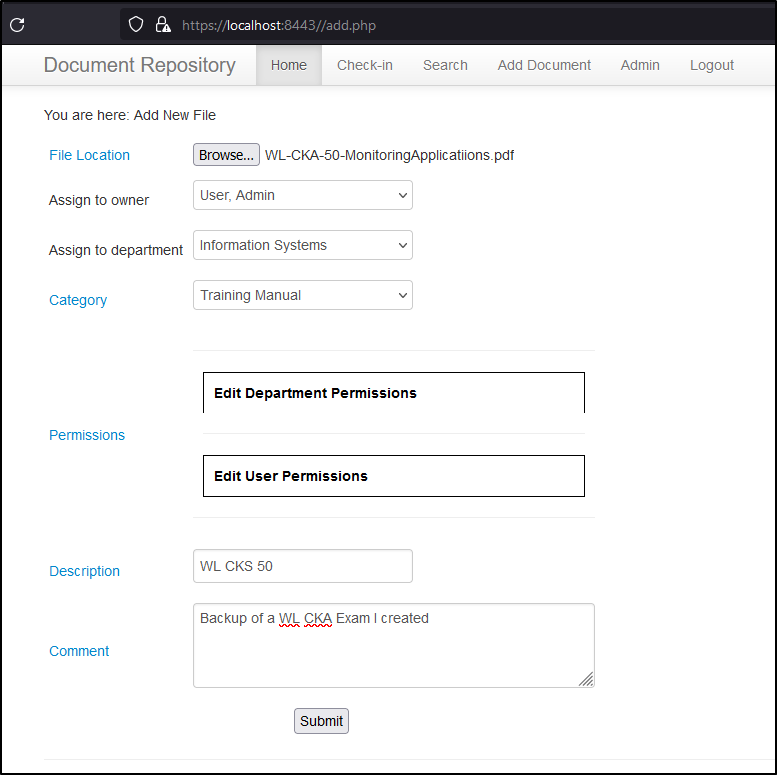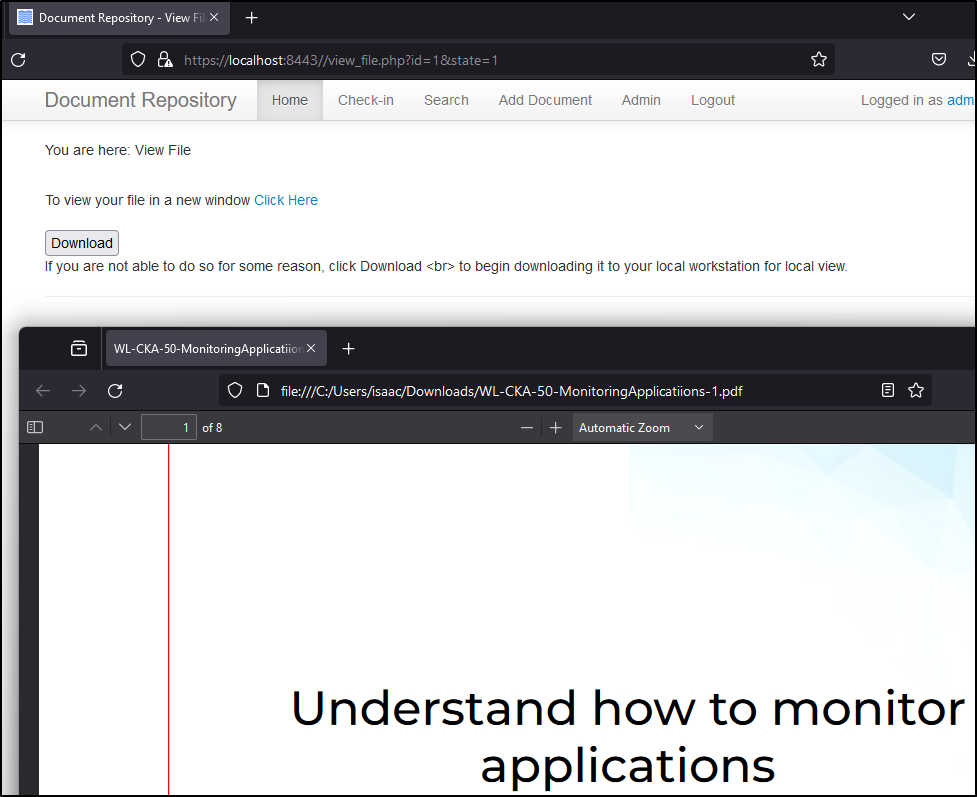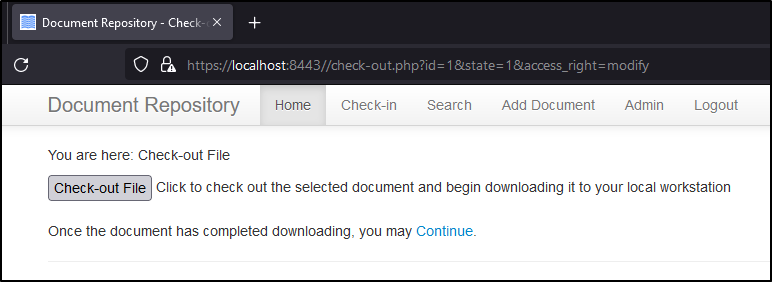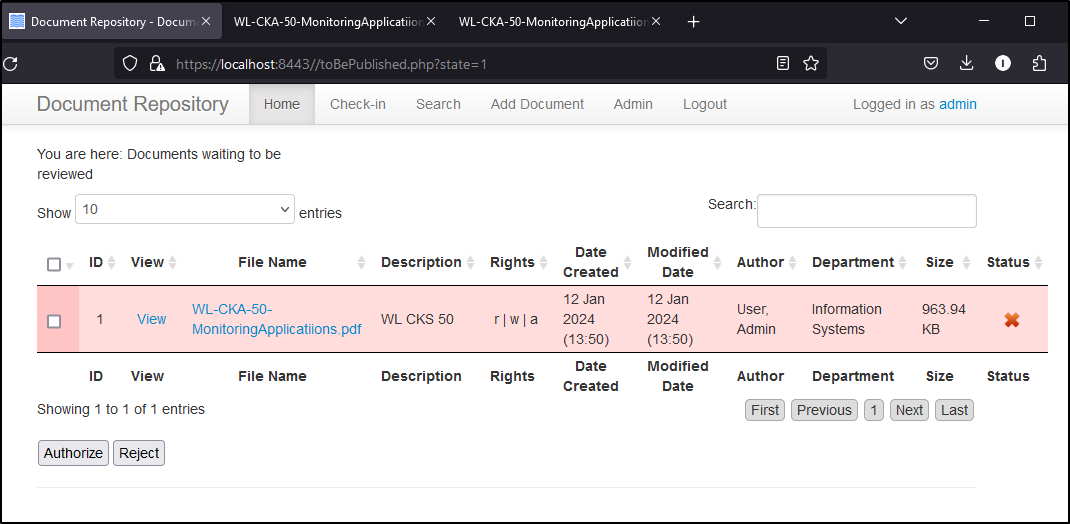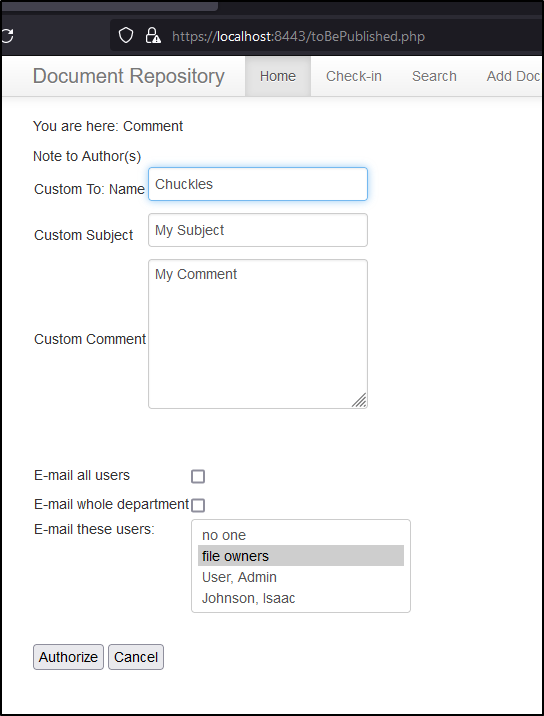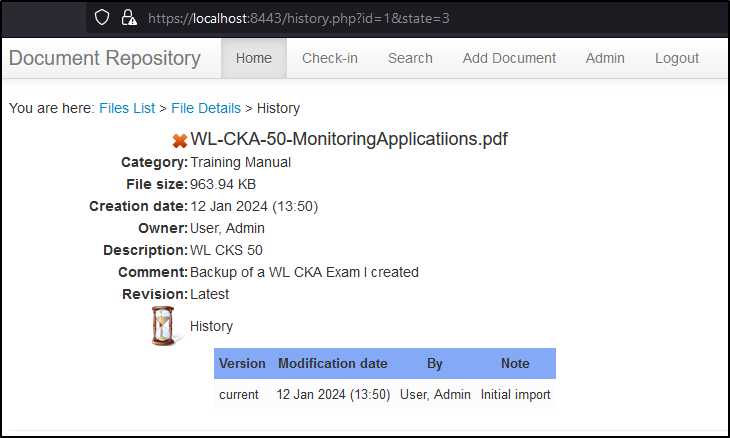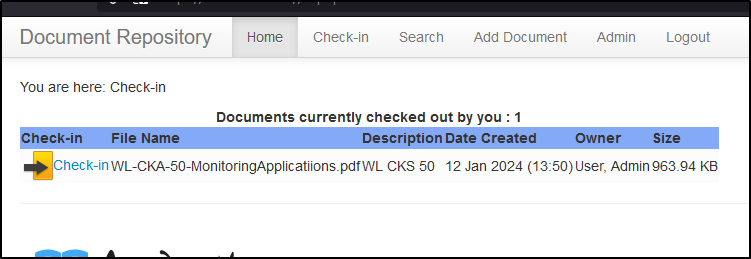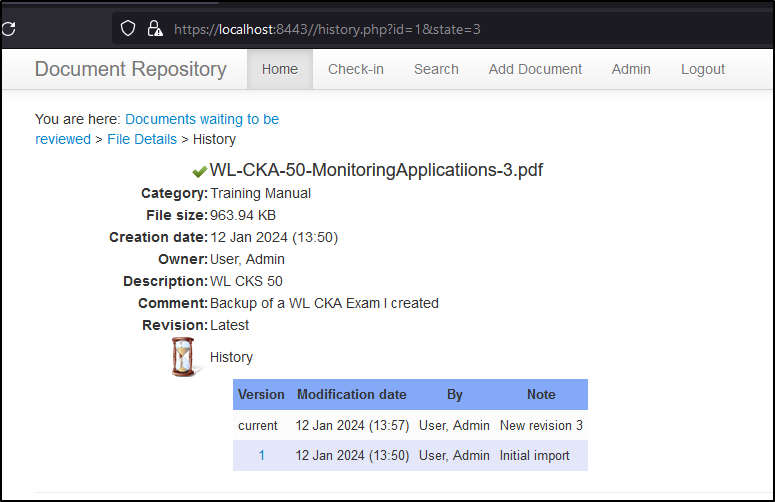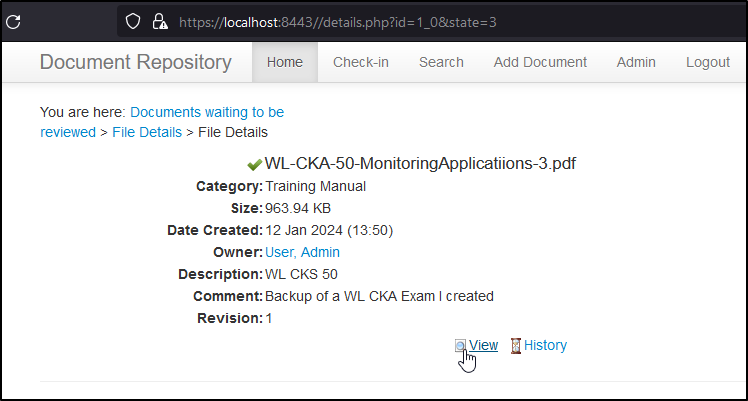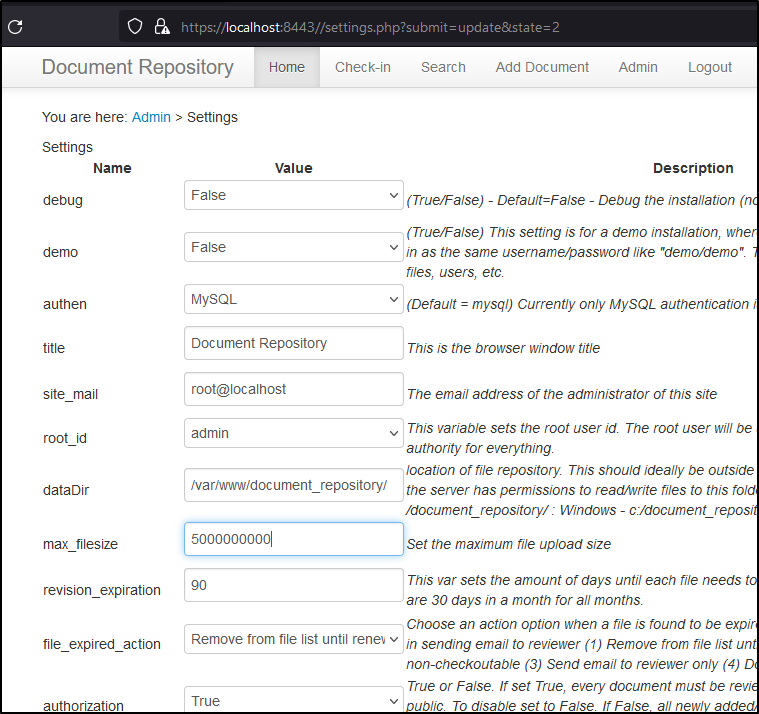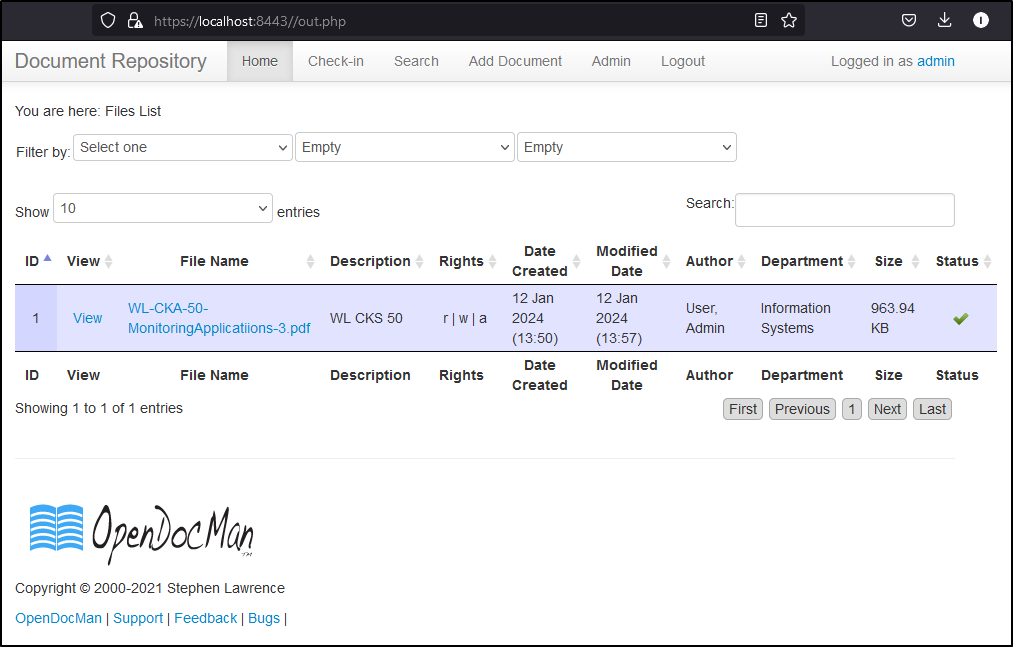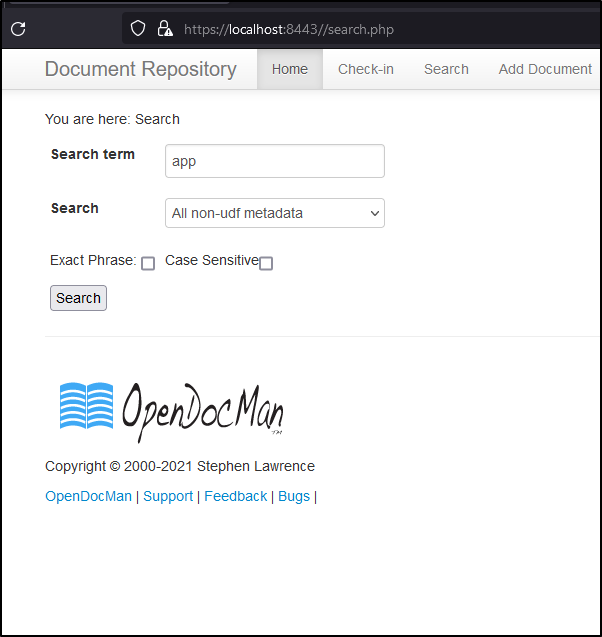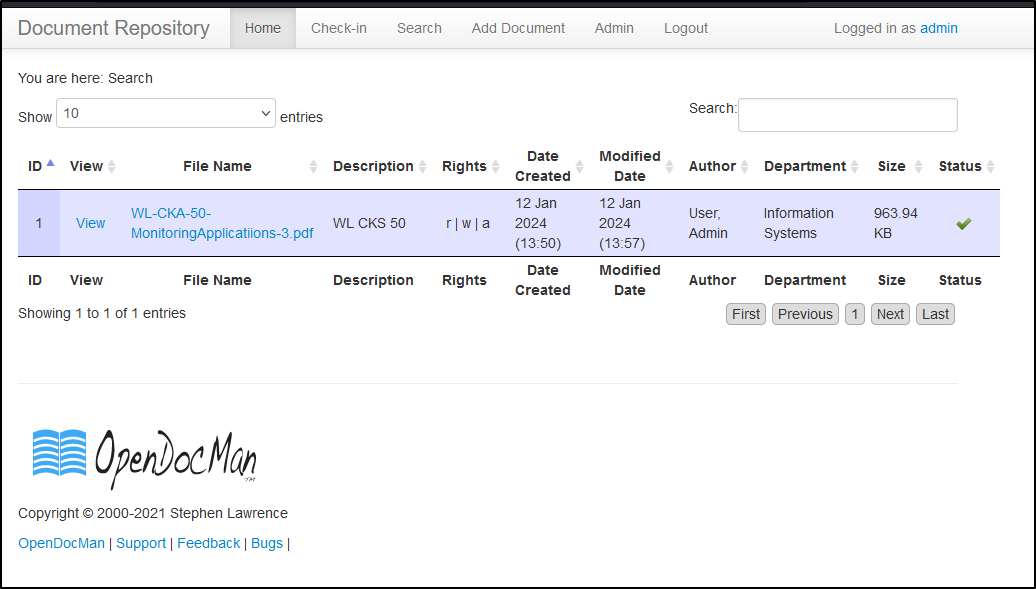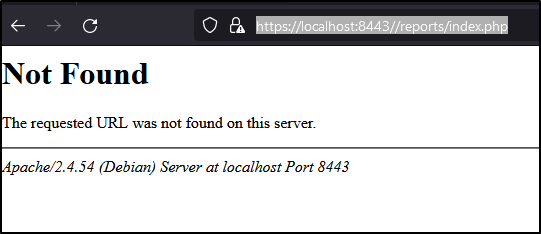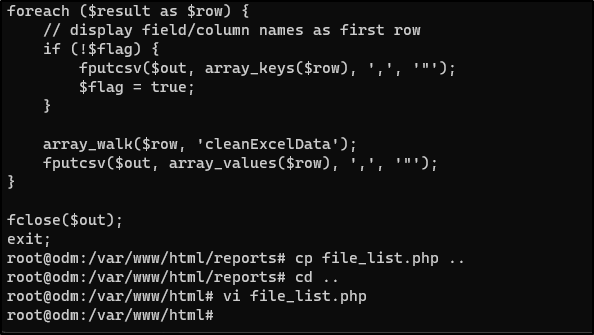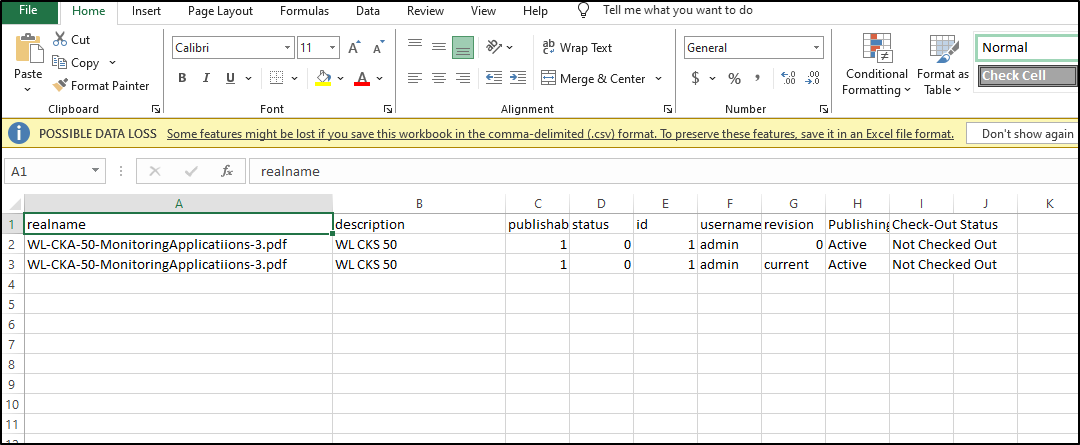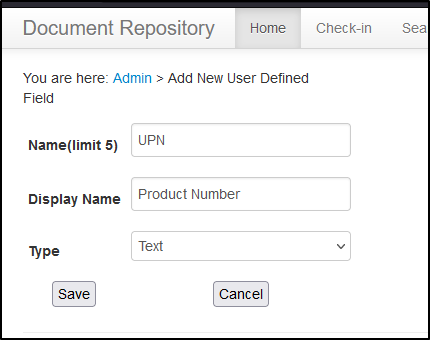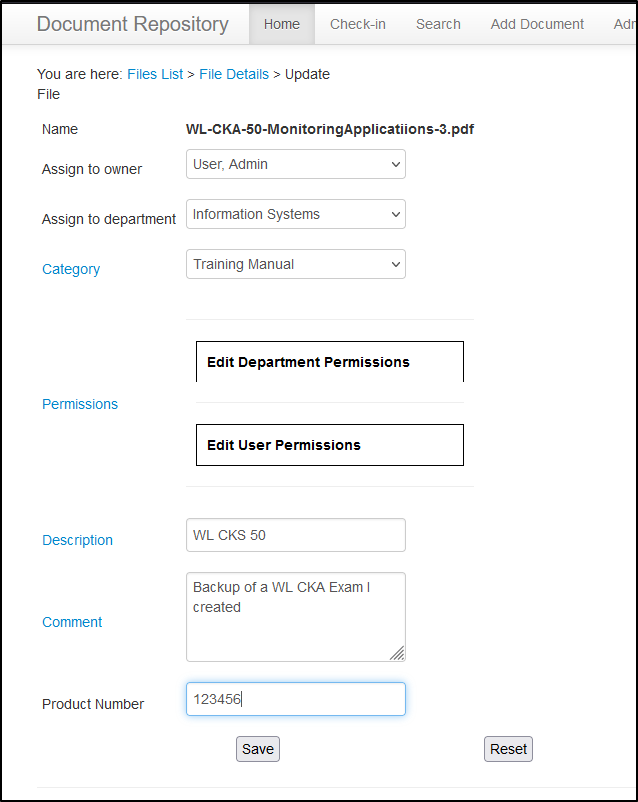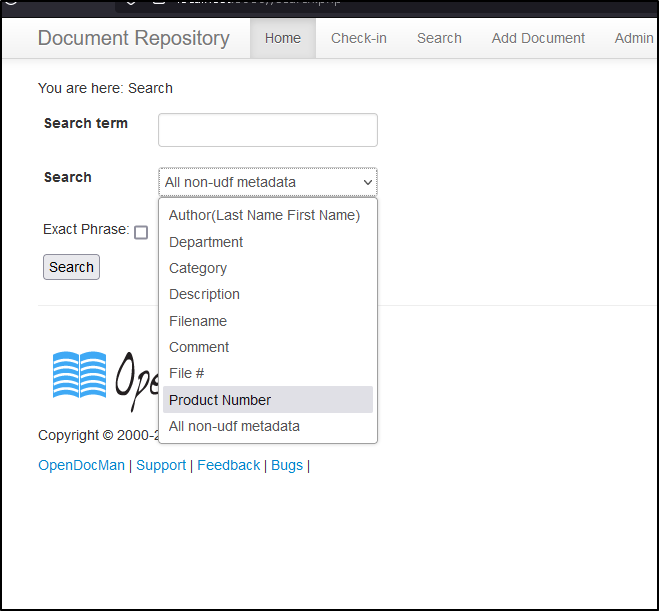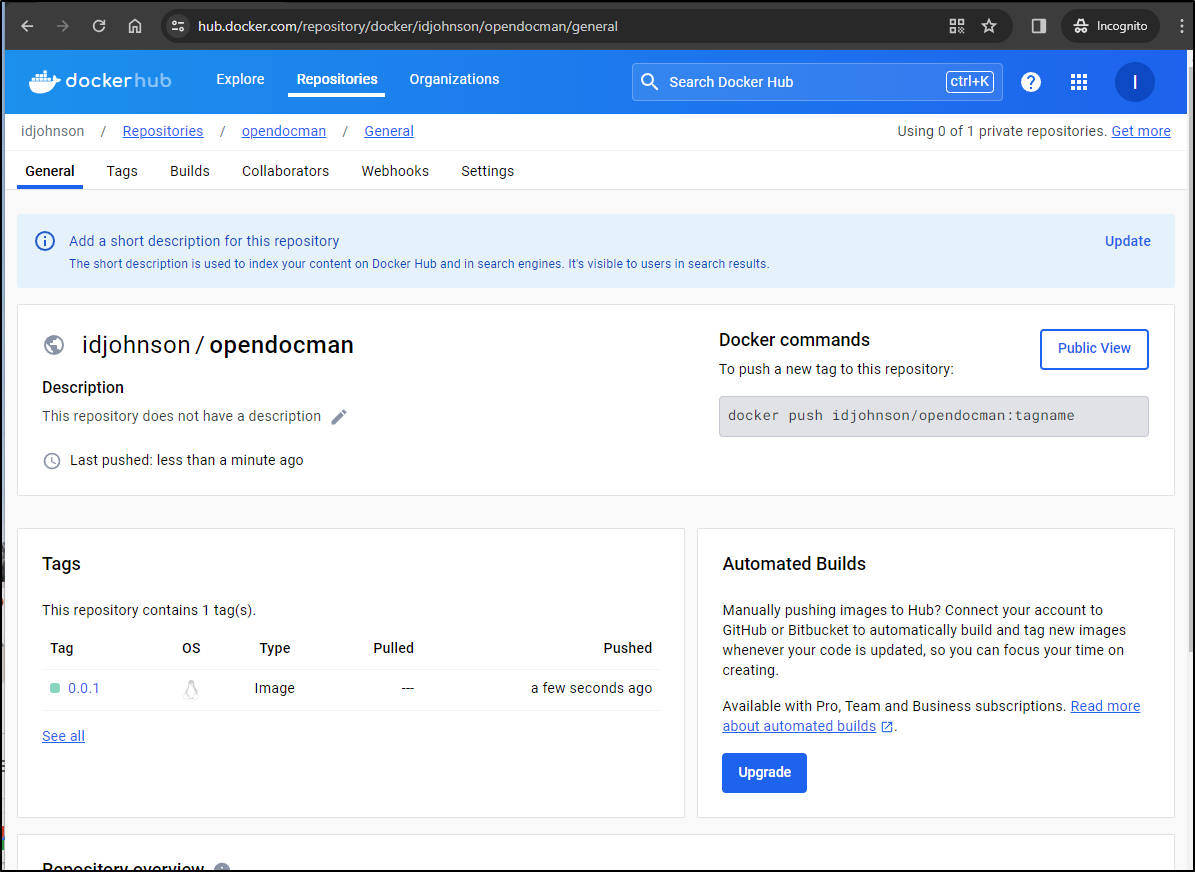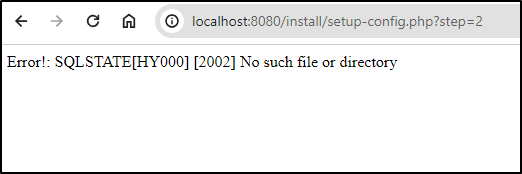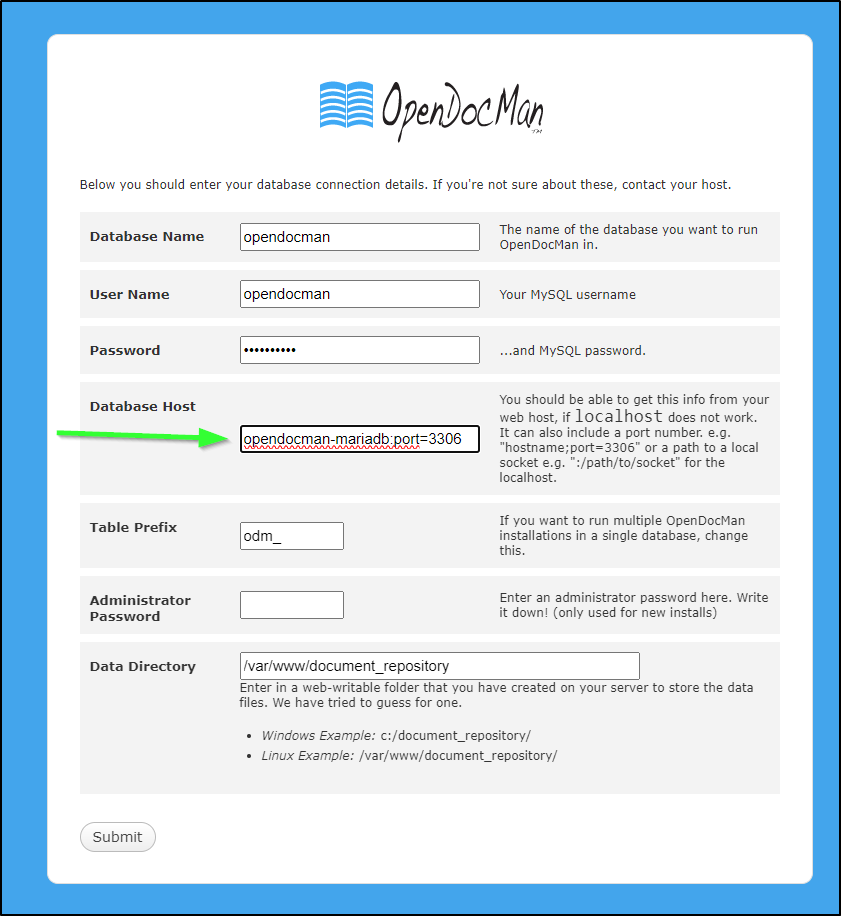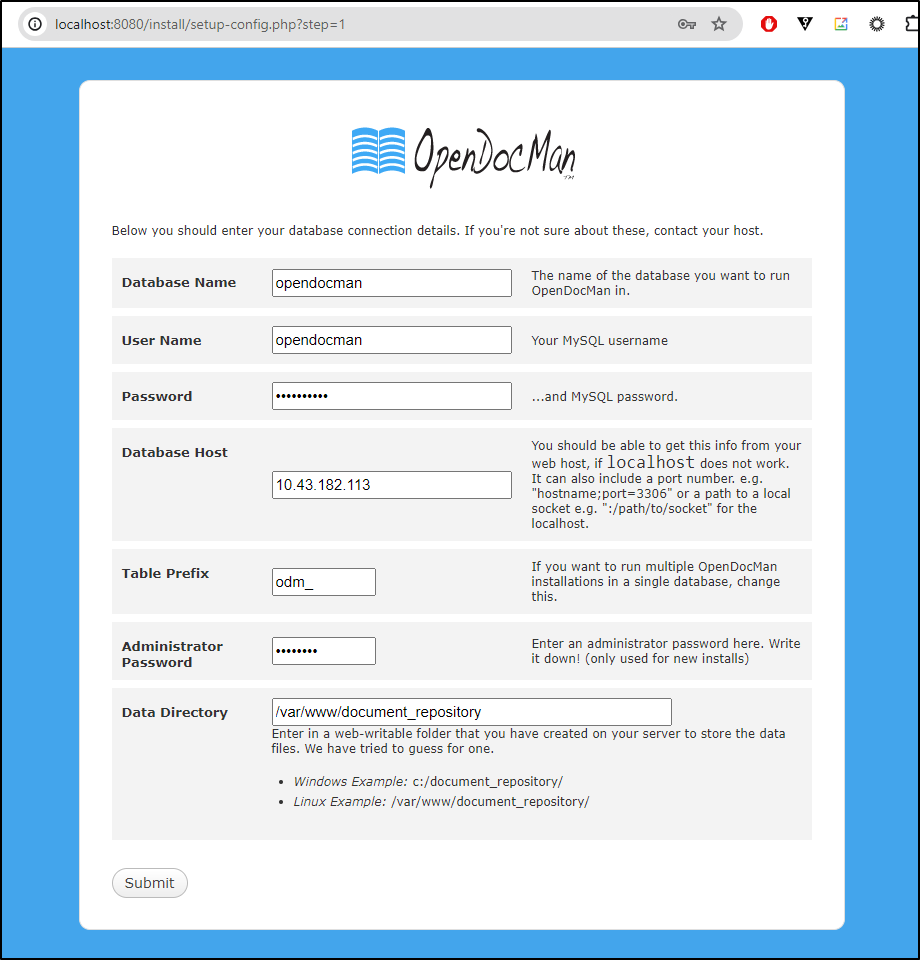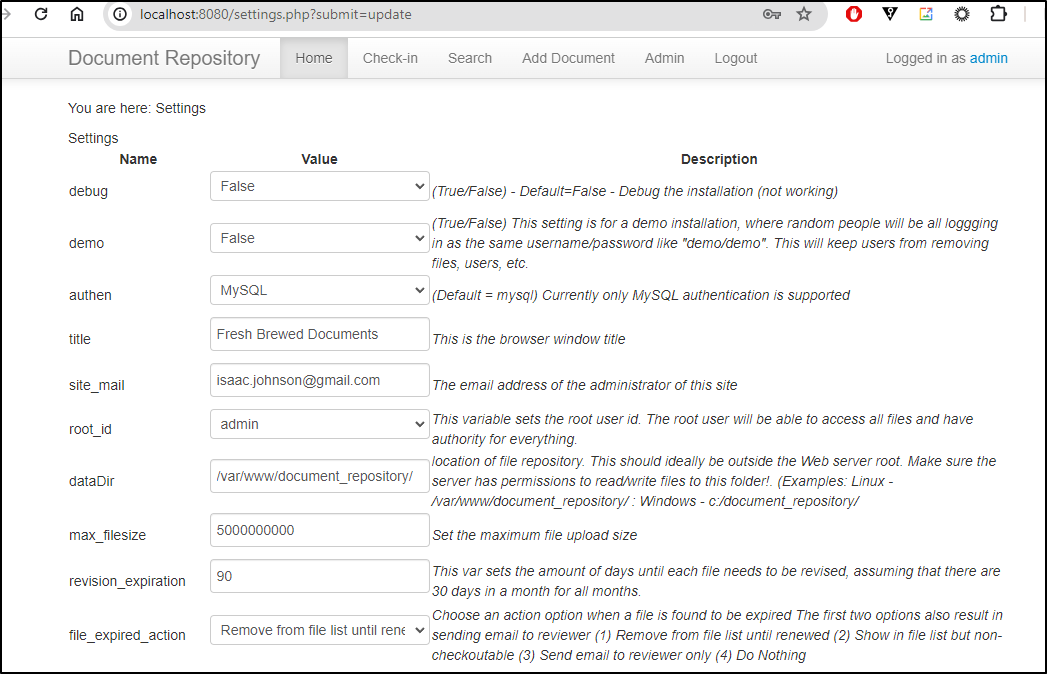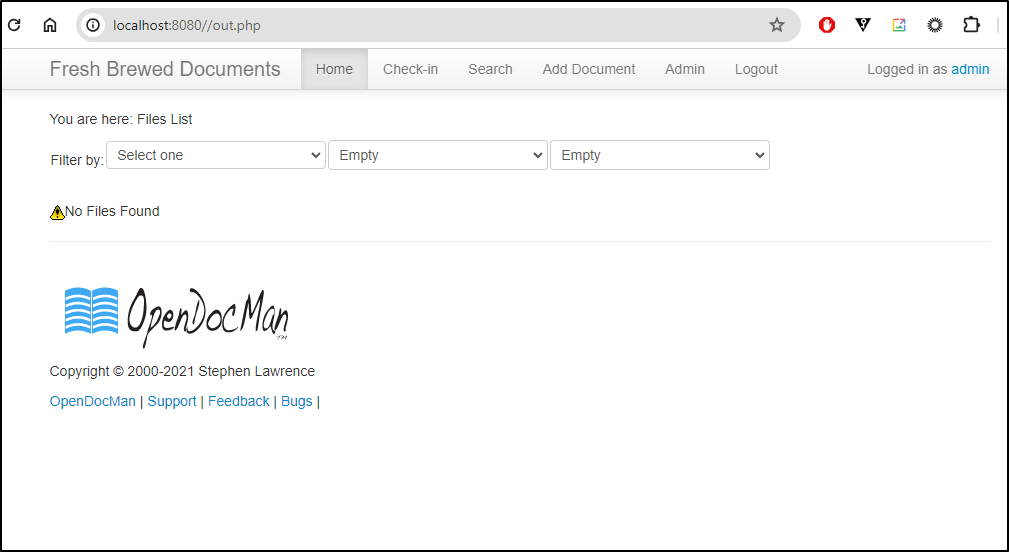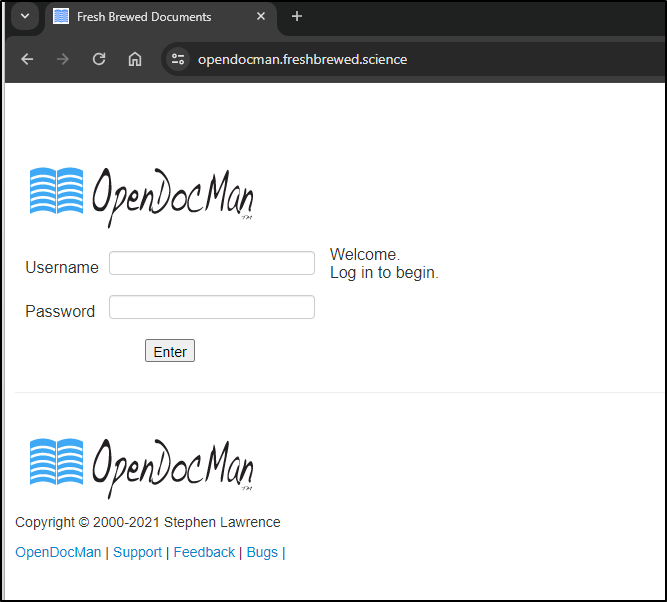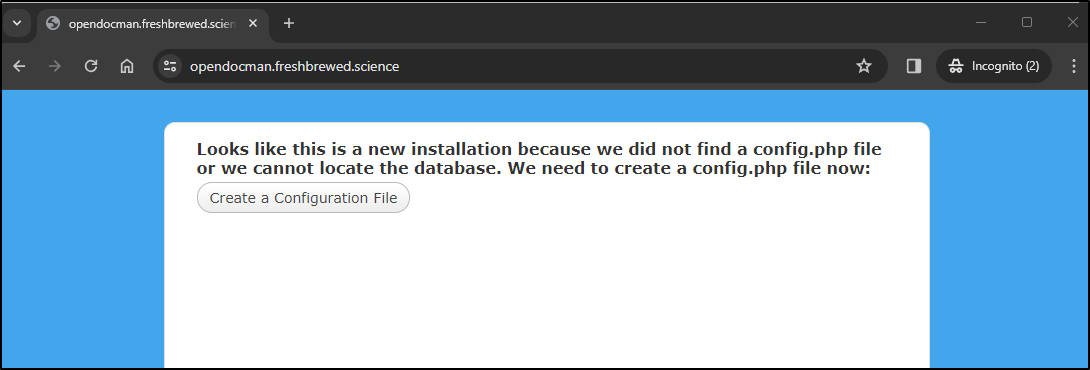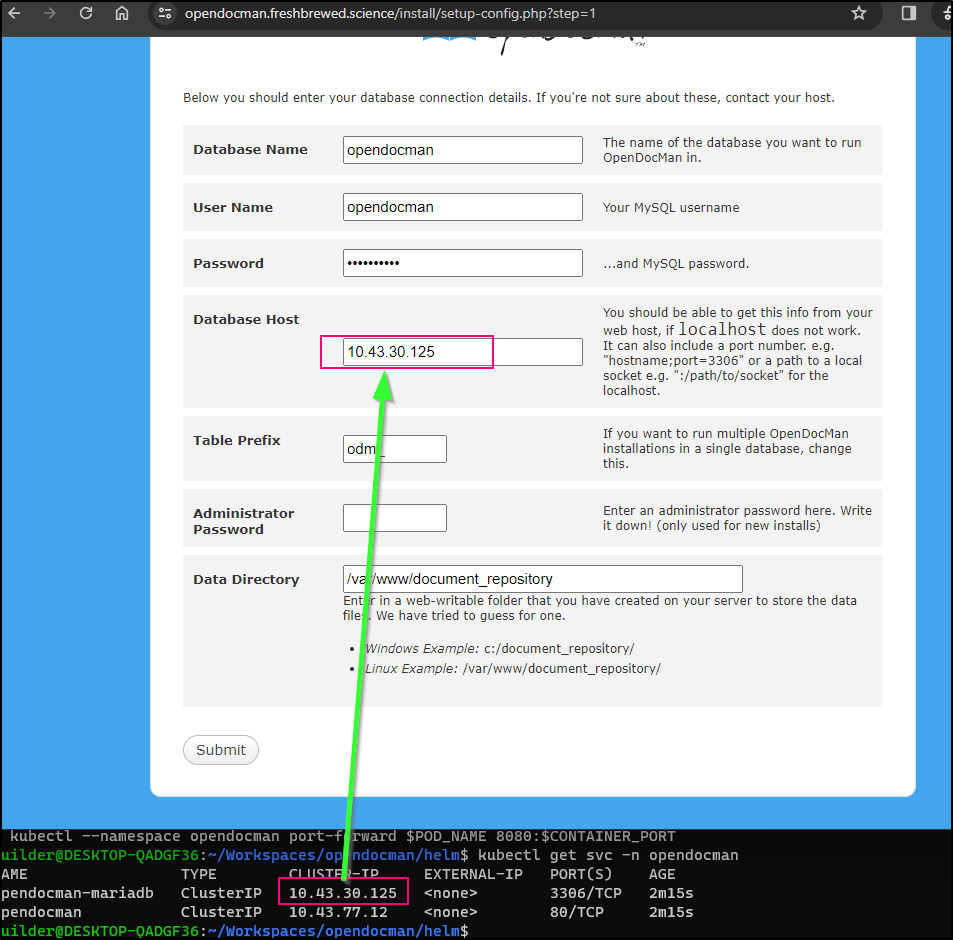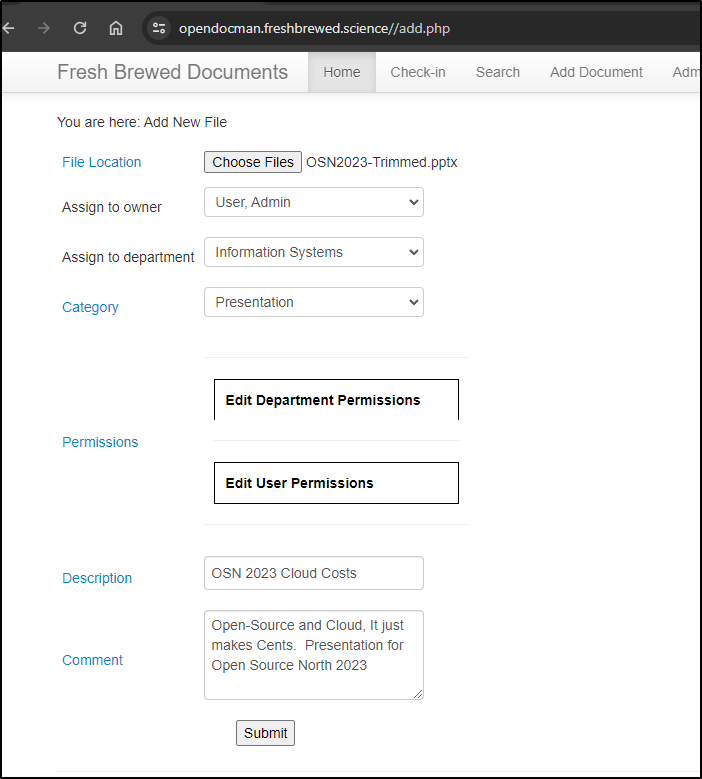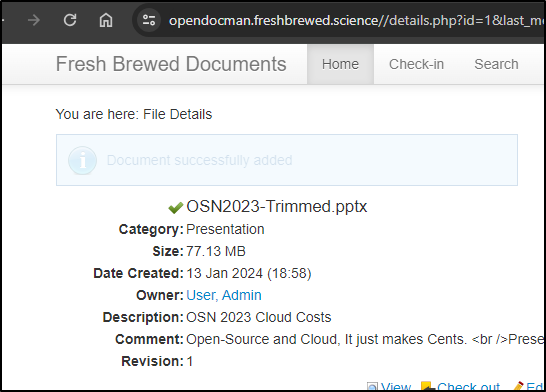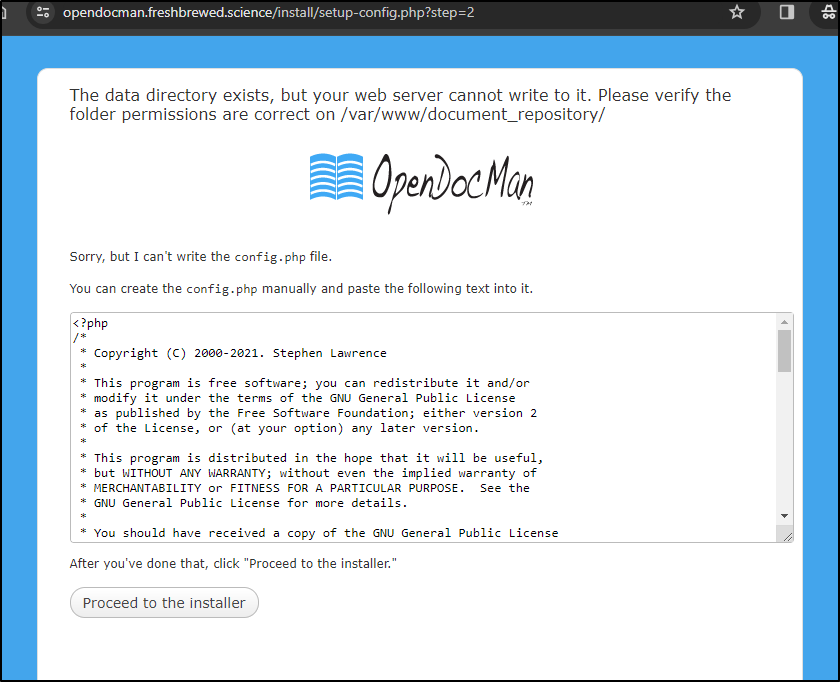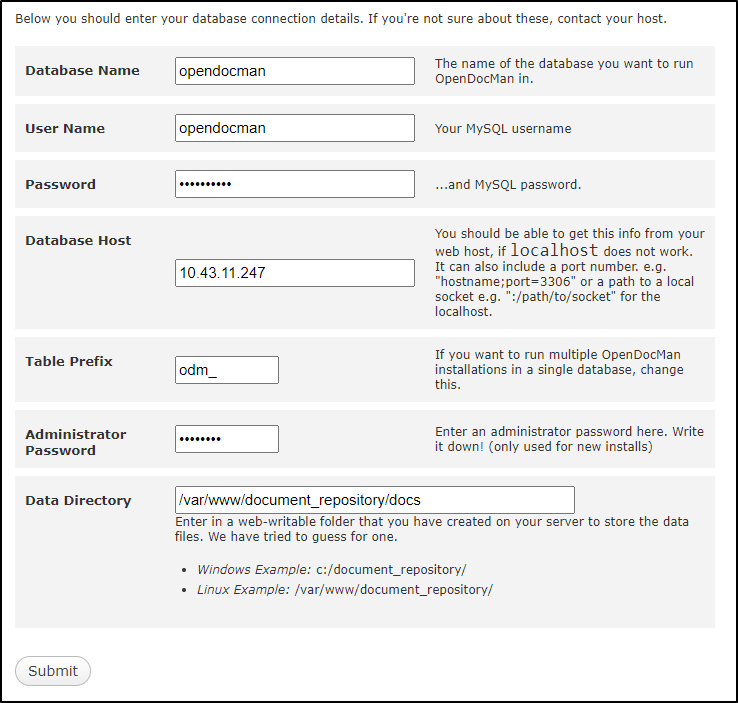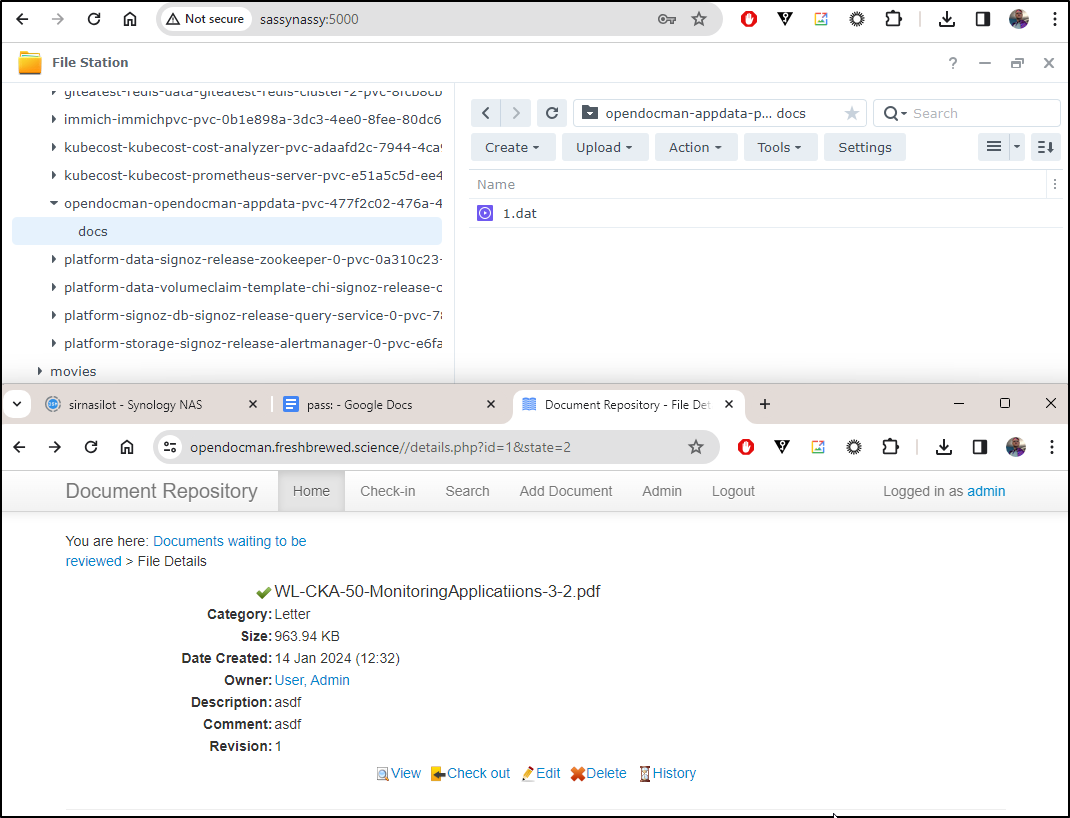Published: Feb 8, 2024 by Isaac Johnson
Today, let’s checkout some Open-Source apps, namely CodeX Docs and OpenDocMan. CodeX is the name of a group of OpenSource engineers and an overall grouping of their packages. OpenDocMan is a pretty old PHP driven Document management system created by Stephen Lawrence Jr.. While, there hasn’t been a release in the Github repo since Mar of 2021, I do see active merges so perhaps a new release is coming. In our writeup, we’ll being using latest from the main (master`) branch.
CodeX Docs
I know of CodeX from their Editor.js. But they also make a server-side implementation as well.
I found out about CodeX from a MariusHosting post a while back.
Docker Installation
Let’s start with the Docker implementation
I need to create some folders first
builder@builder-T100:~$ mkdir codex
builder@builder-T100:~$ cd codex/
builder@builder-T100:~/codex$ ls
builder@builder-T100:~/codex$ mkdir uploads
builder@builder-T100:~/codex$ mkdir db
I’ll then need to make a docs-config.yaml. I based it off the one in their Github repo minus the S3 block.
builder@builder-T100:~/codex$ cat docs-config.yaml
port: 3000
host: "localhost"
uploads:
driver: "local"
local:
path: "./uploads"
frontend:
title: "CodeX Docs"
description: "Free Docs app powered by Editor.js ecosystemt"
startPage: ""
misprintsChatId: "12344564"
yandexMetrikaId: ""
carbon:
serve: ""
placement: ""
menu:
- "Guides"
- title: "CodeX"
uri: "https://codex.so"
auth:
password: mypassword
secret: shhdonttell
hawk:
# frontendToken: "123"
# backendToken: "123"
database:
driver: local # you can change database driver here. 'mongodb' or 'local'
local:
path: ./db
Now I can launch it in my Dockerhost
$ sudo docker run -p 8095:3000 -v /home/builder/codex/uploads:/usr/src/app/uploads -v /home/builder/codex/db:/usr/src/app/db -v /home/builder/codex/docs-config.yaml:/usr/src/app/docs-config.yaml --name codex -d ghcr.io/codex-team/codex.docs:latest
Unable to find image 'ghcr.io/codex-team/codex.docs:latest' locally
latest: Pulling from codex-team/codex.docs
3d2430473443: Pull complete
b60fa0ff74d7: Pull complete
dc7a390288bd: Pull complete
33306f9c18eb: Pull complete
754a8e26ef57: Pull complete
be09c7a20f05: Pull complete
7894e5316a09: Pull complete
af17abb97ba1: Pull complete
33513ffd9fe3: Pull complete
Digest: sha256:fc932818383a59193669ae46953bcc6f1baafee1a659a1200508c69aed0dbad5
Status: Downloaded newer image for ghcr.io/codex-team/codex.docs:latest
c194e587da2e59a17e4e2b0f8bad263217a9bb87808be3852e2bed1769f74062
Since I want to immediately try this remotely, I’ll create the A Record
$ cat r53-codex.json
{
"Comment": "CREATE codex fb.s A record ",
"Changes": [
{
"Action": "CREATE",
"ResourceRecordSet": {
"Name": "codex.freshbrewed.science",
"Type": "A",
"TTL": 300,
"ResourceRecords": [
{
"Value": "75.73.224.240"
}
]
}
}
]
}
$ aws route53 change-resource-record-sets --hosted-zone-id Z39E8QFU0F9PZP --change-batch file://r53-codex.json
{
"ChangeInfo": {
"Id": "/change/C0369074QL16RY8M5PF3",
"Status": "PENDING",
"SubmittedAt": "2024-01-10T00:50:58.985Z",
"Comment": "CREATE codex fb.s A record "
}
}
This first path will just front the traffic from port 8095 on the dockerhost
$ cat ingress.docker.codex.yaml
---
apiVersion: v1
kind: Endpoints
metadata:
name: codex-external-ip
subsets:
- addresses:
- ip: 192.168.1.100
ports:
- name: codex
port: 8095
protocol: TCP
---
apiVersion: v1
kind: Service
metadata:
name: codex-external-ip
spec:
clusterIP: None
clusterIPs:
- None
internalTrafficPolicy: Cluster
ipFamilies:
- IPv4
- IPv6
ipFamilyPolicy: RequireDualStack
ports:
- name: codex
port: 80
protocol: TCP
targetPort: 8095
sessionAffinity: None
type: ClusterIP
---
apiVersion: networking.k8s.io/v1
kind: Ingress
metadata:
annotations:
cert-manager.io/cluster-issuer: letsencrypt-prod
kubernetes.io/ingress.class: nginx
kubernetes.io/tls-acme: "true"
nginx.ingress.kubernetes.io/proxy-read-timeout: "3600"
nginx.ingress.kubernetes.io/proxy-send-timeout: "3600"
nginx.org/websocket-services: codex-external-ip
generation: 1
labels:
app.kubernetes.io/instance: codexingress
name: codexingress
spec:
rules:
- host: codex.freshbrewed.science
http:
paths:
- backend:
service:
name: codex-external-ip
port:
number: 80
path: /
pathType: ImplementationSpecific
tls:
- hosts:
- codex.freshbrewed.science
secretName: codex-tls
Which I applied
$ kubectl apply -f ingress.docker.codex.yaml
endpoints/codex-external-ip created
service/codex-external-ip created
ingress.networking.k8s.io/codexingress created
I can now see the live site
To add a page, one has to enter a password
I can now start to add content with the password (mypassword) entered
let’s work out the first page together
I now have this page setup
If we hop to a different browser to check non-logged in users we can see it here:
Native Kubernetes
I’ll start by taking my docs-config.yaml and create a ConfigMap out of it
builder@LuiGi17:~/Workspaces/codex$ vi docs-config.yaml
builder@LuiGi17:~/Workspaces/codex$ kubectl create configmap codex-config --from-file=./docs-config.yaml --dry-run=client -o yaml >> k8s.deployment.yaml
builder@LuiGi17:~/Workspaces/codex$ vi k8s.deployment.yaml
Next, I need to add some PVCs for app uploads and the db volume:
---
apiVersion: v1
kind: PersistentVolumeClaim
metadata:
name: codex-db
spec:
accessModes:
- ReadWriteOnce
storageClassName: managed-nfs-storage
resources:
requests:
storage: 5Gi
---
apiVersion: v1
kind: PersistentVolumeClaim
metadata:
name: codex-api
spec:
accessModes:
- ReadWriteOnce
storageClassName: managed-nfs-storage
resources:
requests:
storage: 5Gi
I’ll need a deployment, service and lastly Ingress added.
All in, the file now looks like this:
---
apiVersion: v1
kind: PersistentVolumeClaim
metadata:
name: codex-db
spec:
accessModes:
- ReadWriteOnce
storageClassName: managed-nfs-storage
resources:
requests:
storage: 5Gi
---
apiVersion: v1
kind: PersistentVolumeClaim
metadata:
name: codex-uploads
spec:
accessModes:
- ReadWriteOnce
storageClassName: managed-nfs-storage
resources:
requests:
storage: 10Gi
---
apiVersion: apps/v1
kind: Deployment
metadata:
name: codex
spec:
replicas: 2
selector:
matchLabels:
app: codex
template:
metadata:
labels:
app: codex
spec:
containers:
- name: codex
image: ghcr.io/codex-team/codex.docs:latest
ports:
- containerPort: 3000
volumeMounts:
- name: db
mountPath: /usr/src/app/db
- name: uploads
mountPath: /usr/src/app/uploads
- name: config-volume
mountPath: /usr/src/app/docs-config.yaml
subPath: docs-config.yaml
volumes:
- name: db
persistentVolumeClaim:
claimName: codex-db
- name: uploads
persistentVolumeClaim:
claimName: codex-uploads
- name: config-volume
configMap:
name: codex-config
---
apiVersion: v1
kind: Service
metadata:
name: codex
spec:
selector:
app: codex
ports:
- protocol: TCP
port: 80
targetPort: 3000
---
apiVersion: networking.k8s.io/v1
kind: Ingress
metadata:
annotations:
cert-manager.io/cluster-issuer: letsencrypt-prod
kubernetes.io/ingress.class: nginx
kubernetes.io/tls-acme: "true"
nginx.ingress.kubernetes.io/proxy-read-timeout: "3600"
nginx.ingress.kubernetes.io/proxy-send-timeout: "3600"
labels:
app.kubernetes.io/instance: codex
name: codexingress
spec:
rules:
- host: codex.freshbrewed.science
http:
paths:
- backend:
service:
name: codex
port:
number: 80
path: /
pathType: ImplementationSpecific
tls:
- hosts:
- codex.freshbrewed.science
secretName: codex-tls
---
apiVersion: v1
data:
docs-config.yaml: |
port: 3000
host: "localhost"
uploads:
driver: "local"
local:
path: "./uploads"
frontend:
title: "Freshbrewed CodeX Docs"
description: "Free Docs app powered by Editor.js ecosystemt"
startPage: ""
misprintsChatId: "12344564"
yandexMetrikaId: ""
carbon:
serve: ""
placement: ""
menu:
- "Guides"
- title: "CodeX"
uri: "https://codex.so"
auth:
password: Darfdarf01
secret: chucklestheclown1234
hawk:
# frontendToken: "123"
# backendToken: "123"
database:
driver: local # you can change database driver here. 'mongodb' or 'local'
local:
path: ./db
kind: ConfigMap
metadata:
creationTimestamp: null
name: codex-config
I’ll start by removing the Docker version
$ kubectl delete -f ingress.docker.codex.yaml
endpoints "codex-external-ip" deleted
service "codex-external-ip" deleted
ingress.networking.k8s.io "codexingress" deleted
Then applying this new one
$ kubectl apply -f ingress.all.codex.yaml
persistentvolumeclaim/codex-db created
persistentvolumeclaim/codex-uploads created
deployment.apps/codex created
service/codex created
ingress.networking.k8s.io/codexingress created
configmap/codex-config created
I can see it is running already
As I have two pods running
$ kubectl get pods | grep codex
codex-5bdb5ccf57-zctqd 1/1 Running 0 3m9s
codex-5bdb5ccf57-t4qqt 1/1 Running 0 3m9s
I can jump into one and see the format of this file
$ kubectl exec -it codex-5bdb5ccf57-zctqd -- /bin/sh
/usr/src/app # ls
db docs-config.yaml package.json uploads
dist node_modules public yarn.lock
/usr/src/app # cat ./db/pages.db
{"_id":"Y3bQwyJXNZlqh3f9","title":"First Page with Kubernetes","uri":"first-page-with-kubernetes","body":{"time":1705017534614,"blocks":[{"id":"9Pq3-QBzh-","type":"header","data":{"text":"First Page with Kubernetes","level":2}},{"id":"lULydonHCh","type":"paragraph","data":{"text":"Yay!"}}],"version":"2.25.0"},"parent":"0"}
I tried editting with vi
and I can go to the other pod and see it’s there
builder@LuiGi17:~/Workspaces/jekyll-blog$ kubectl exec -it codex-5bdb5ccf57-t4qqt -- /bin/sh
/usr/src/app # ls
db docs-config.yaml package.json uploads
dist node_modules public yarn.lock
/usr/src/app # ls uploads
/usr/src/app # ls db
aliases.db files.db pages.db pagesOrder.db
/usr/src/app # ls -l db
total 12
-rw-r--r-- 1 root root 126 Jan 11 23:58 aliases.db
-rw-r--r-- 1 root root 0 Jan 11 23:56 files.db
-rw-r--r-- 1 root root 339 Jan 12 00:02 pages.db
-rw-r--r-- 1 root root 67 Jan 11 23:58 pagesOrder.db
/usr/src/app # cat ./db/pages
cat: can't open './db/pages': No such file or directory
/usr/src/app # cat ./db/pages.db
{"_id":"Y3bQwyJXNZlqh3f9","title":"First Page with Kubernetes. editted w vi","uri":"first-page-with-kubernetes","body":{"time":1705017534614,"blocks":[{"id":"9Pq3-QBzh-","type":"header","data":{"text":"First Page with Kubernetes","level":2}},{"id":"lULydonHCh","type":"paragraph","data":{"text":"Yay!"}}],"version":"2.25.0"},"parent":"0"}
However, on refresh, I would get either a 404 or a cached copy of the old page
I rotated the pods
$ kubectl delete pods -l app=codex
pod "codex-5bdb5ccf57-zctqd" deleted
pod "codex-5bdb5ccf57-t4qqt" deleted
but still showing me the last page
I editted in the UI
However, every other reload or so showed the old page. Perhaps this isn’t an app that can do multiple replicas well.
I decided to scale down to avoid that issue
$ kubectl scale deployment/codex --replicas=1
deployment.apps/codex scaled
$ kubectl get pods -l app=codex
NAME READY STATUS RESTARTS AGE
codex-5bdb5ccf57-x6k8t 1/1 Running 0 4m38s
codex-5bdb5ccf57-xsj44 1/1 Terminating 0 4m38s
Checking the pod, I do see the edit
$ kubectl exec codex-5bdb5ccf57-x6k8t cat "/usr/src/app/db/pages.db"
kubectl exec [POD] [COMMAND] is DEPRECATED and will be removed in a future version. Use kubectl exec [POD] -- [COMMAND] instead.
{"_id":"Y3bQwyJXNZlqh3f9","title":"First Page with Kubernetes. editted w vi","uri":"first-page-with-kubernetes","body":{"time":1705017534614,"blocks":[{"id":"9Pq3-QBzh-","type":"header","data":{"text":"First Page with Kubernetes","level":2}},{"id":"lULydonHCh","type":"paragraph","data":{"text":"Yay!"}}],"version":"2.25.0"},"parent":"0"}
{"_id":"Y3bQwyJXNZlqh3f9","title":"First Page with Kubernetes NEW","uri":"first-page-with-kubernetes","body":{"time":1705018231563,"blocks":[{"id":"9Pq3-QBzh-","type":"header","data":{"text":"First Page with Kubernetes NEW","level":2}},{"id":"lULydonHCh","type":"paragraph","data":{"text":"Yay!"}}],"version":"2.25.0"},"parent":"0"}
Small Images would upload but I got errors when tryin a 3Mb image
I’m going to tweak the ingress with some new annotations
apiVersion: networking.k8s.io/v1
kind: Ingress
metadata:
annotations:
cert-manager.io/cluster-issuer: letsencrypt-prod
kubernetes.io/ingress.class: nginx
kubernetes.io/tls-acme: "true"
nginx.ingress.kubernetes.io/proxy-read-timeout: "3600"
nginx.ingress.kubernetes.io/proxy-send-timeout: "3600"
ingress.kubernetes.io/proxy-body-size: "0"
ingress.kubernetes.io/ssl-redirect: "true"
nginx.ingress.kubernetes.io/proxy-body-size: "0"
nginx.ingress.kubernetes.io/ssl-redirect: "true"
nginx.org/client-max-body-size: "0"
nginx.org/proxy-connect-timeout: "3600"
nginx.org/proxy-read-timeout: "3600"
Then re-apply (I find with Nginx, a delete then add works better)
$ kubectl delete ingress codexingress
ingress.networking.k8s.io "codexingress" deleted
$ kubectl apply -f ./ingress.all.codex.yaml
persistentvolumeclaim/codex-db unchanged
persistentvolumeclaim/codex-uploads unchanged
deployment.apps/codex configured
service/codex unchanged
ingress.networking.k8s.io/codexingress created
configmap/codex-config configured
This time it worked great
And we can see the larger image
If we wanted to embed a video, such as from YT, we can get the embed video
Now I can add it to a CodeX Page
and we can see the video and play it
OpenDocMan
First, I just have to call it out. The name of this tool really just makes me think of people yelling
Setup
Let’s first bring down the latest Git code from their repo
builder@DESKTOP-QADGF36:~/Workspaces$ git clone https://github.com/opendocman/opendocman.git
Cloning into 'opendocman'...
remote: Enumerating objects: 12738, done.
remote: Counting objects: 100% (1709/1709), done.
remote: Compressing objects: 100% (913/913), done.
remote: Total 12738 (delta 727), reused 1684 (delta 725), pack-reused 11029
Receiving objects: 100% (12738/12738), 9.55 MiB | 18.53 MiB/s, done.
Resolving deltas: 100% (5669/5669), done.
At first, I tried just a docker compose up
builder@DESKTOP-QADGF36:~/Workspaces/opendocman$ docker compose up
[+] Running 10/10
⠿ db Pulled 6.1s
⠿ 527f5363b98e Pull complete 1.6s
⠿ bda22cfb6e45 Pull complete 1.7s
⠿ 17bea36fca0c Pull complete 2.0s
⠿ e30c36a0d4a4 Pull complete 2.1s
⠿ 8f06f892ff54 Pull complete 2.2s
⠿ 11e00e2f44db Pull complete 4.2s
⠿ 041d97613a4d Pull complete 4.3s
⠿ bd5b12e516b7 Pull complete 4.3s
⠿ aeb489c6fb29 Pull complete 4.4s
[+] Building 98.4s (15/15) FINISHED
=> [internal] load build definition from Dockerfile 0.0s
=> => transferring dockerfile: 952B 0.0s
=> [internal] load .dockerignore 0.0s
=> => transferring context: 2B 0.0s
=> [internal] load metadata for docker.io/library/php:7.4-apache 2.6s
=> [ 1/10] FROM docker.io/library/php:7.4-apache@sha256:c9d7e608f73832673479770d66aacc8100011ec751d1905ff63fae3fe2e0ca6d 6.6s
=> => resolve docker.io/library/php:7.4-apache@sha256:c9d7e608f73832673479770d66aacc8100011ec751d1905ff63fae3fe2e0ca6d 0.0s
=> => sha256:18b3497ee7f2099a90b66c23a0bc3d5261b12bab367263e1b40e9b004c39e882 3.04kB / 3.04kB 0.0s
=> => sha256:20a3732f422b7b28dcf99e8597f093a8c135efca62ff0dc02a2d92d916369413 12.51kB / 12.51kB 0.0s
=> => sha256:c428f1a494230852524a2a5957cc5199c36c8b403305e0e877d580bd0ec9e763 226B / 226B 0.1s
=> => sha256:156740b07ef8a632f9f7bea4e57e4ee5541ade376adf9169351a1265382e39de 91.63MB / 91.63MB 2.8s
=> => sha256:c9d7e608f73832673479770d66aacc8100011ec751d1905ff63fae3fe2e0ca6d 1.86kB / 1.86kB 0.0s
=> => sha256:a603fa5e3b4127f210503aaa6189abf6286ee5a73deeaab460f8f33ebc6b64e2 31.41MB / 31.41MB 1.2s
=> => sha256:fb5a4c8af82f00730b7427e47bda7f76cea2e2b9aea421750bc9025aface98d8 270B / 270B 0.3s
=> => sha256:25f85b498fd5bfc6cce951513219fe480850daba71e6e997741e984d18483971 19.25MB / 19.25MB 1.8s
=> => sha256:9b233e420ac7bbca645bb82c213029762acf1742400c076360dc303213c309d5 475B / 475B 1.4s
=> => extracting sha256:a603fa5e3b4127f210503aaa6189abf6286ee5a73deeaab460f8f33ebc6b64e2 1.0s
=> => sha256:fe42347c4ecfc90333acd9cad13912387eea39d13827a25cfa78727fa5d200e9 514B / 514B 1.5s
=> => sha256:d14eb2ed1e17ae00f5fcb44b0d562e2867c401c20372829e2cf443fc409342fa 10.76MB / 10.76MB 2.1s
=> => sha256:66d98f73acb62e86c0c226f9eedcbc7eda305df0c1e171ca5caf81cb8b1c40cb 491B / 491B 1.9s
=> => sha256:d2c43c5efbc861f83ee6565c7102ca660d6f35e158324fbb042de5017e43afe8 10.20MB / 10.20MB 2.6s
=> => sha256:ab590b48ea476386dd7b07c34de9eff7cf2103c4668ade985fe31e59f15deee8 2.46kB / 2.46kB 2.2s
=> => sha256:80692ae2d067c8358112c56490a2a97f69ef395fd8f7662a31498644c9a813ef 246B / 246B 2.6s
=> => extracting sha256:c428f1a494230852524a2a5957cc5199c36c8b403305e0e877d580bd0ec9e763 0.0s
=> => sha256:05e465aaa99a358add4acecdade8f39843089069f31fea0201533d3a09a98c9a 892B / 892B 2.7s
=> => extracting sha256:156740b07ef8a632f9f7bea4e57e4ee5541ade376adf9169351a1265382e39de 2.0s
=> => extracting sha256:fb5a4c8af82f00730b7427e47bda7f76cea2e2b9aea421750bc9025aface98d8 0.0s
=> => extracting sha256:25f85b498fd5bfc6cce951513219fe480850daba71e6e997741e984d18483971 0.4s
=> => extracting sha256:9b233e420ac7bbca645bb82c213029762acf1742400c076360dc303213c309d5 0.0s
=> => extracting sha256:fe42347c4ecfc90333acd9cad13912387eea39d13827a25cfa78727fa5d200e9 0.0s
=> => extracting sha256:d14eb2ed1e17ae00f5fcb44b0d562e2867c401c20372829e2cf443fc409342fa 0.1s
=> => extracting sha256:66d98f73acb62e86c0c226f9eedcbc7eda305df0c1e171ca5caf81cb8b1c40cb 0.0s
=> => extracting sha256:d2c43c5efbc861f83ee6565c7102ca660d6f35e158324fbb042de5017e43afe8 0.3s
=> => extracting sha256:ab590b48ea476386dd7b07c34de9eff7cf2103c4668ade985fe31e59f15deee8 0.0s
=> => extracting sha256:80692ae2d067c8358112c56490a2a97f69ef395fd8f7662a31498644c9a813ef 0.0s
=> => extracting sha256:05e465aaa99a358add4acecdade8f39843089069f31fea0201533d3a09a98c9a 0.0s
=> [internal] load build context 0.3s
=> => transferring context: 21.83MB 0.3s
=> [ 2/10] RUN apt-get update && apt-get install --no-install-recommends -y apt-utils vim git openssl ssl-cert sendmail 85.2s
=> [ 3/10] COPY src/main/resources/php.ini /usr/local/etc/php/conf.d 0.0s
=> [ 4/10] RUN a2enmod rewrite 0.5s
=> [ 5/10] RUN a2ensite default-ssl 0.6s
=> [ 6/10] RUN a2enmod ssl 0.7s
=> [ 7/10] COPY . /var/www/html 0.1s
=> [ 8/10] RUN usermod -u 1000 www-data 0.5s
=> [ 9/10] COPY src/main/resources/*.sh / 0.0s
=> [10/10] RUN chmod 755 /*.sh 0.6s
=> exporting to image 0.7s
=> => exporting layers 0.6s
=> => writing image sha256:efcf28f6ed40b01a78bc8e20f2b3e630769acb93be72af6a5b628ca2675a0ef7 0.0s
=> => naming to docker.io/library/opendocman-app 0.0s
[+] Running 6/5
⠿ Network opendocman_default Created 0.2s
⠿ Volume "opendocman_odm-db-data" Created 0.0s
⠿ Volume "opendocman_odm-files-data" Created 0.0s
⠿ Volume "opendocman_odm-docker-configs" Created 0.0s
⠿ Container opendocman-db-1 Created 0.0s
⠿ Container opendocman-app-1 Created 0.1s
Attaching to opendocman-app-1, opendocman-db-1
opendocman-db-1 | 2024-01-12 12:55:08+00:00 [Note] [Entrypoint]: Entrypoint script for MariaDB Server 1:10.4.32+maria~ubu2004 started.
opendocman-db-1 | 2024-01-12 12:55:08+00:00 [Note] [Entrypoint]: Switching to dedicated user 'mysql'
opendocman-db-1 | 2024-01-12 12:55:08+00:00 [Note] [Entrypoint]: Entrypoint script for MariaDB Server 1:10.4.32+maria~ubu2004 started.
opendocman-db-1 | 2024-01-12 12:55:09+00:00 [Note] [Entrypoint]: Initializing database files
Error response from daemon: driver failed programming external connectivity on endpoint opendocman-app-1 (09f1b366d19dbd6d248fd954e61b34a689f9d690bd844dbea55757e2571480bb): Bind for 0.0.0.0:80 failed: port is already allocated
But the default port of 80 was clearly in use
I changed the docker-compose file to use different ports
$ git diff docker-compose.yml
diff --git a/docker-compose.yml b/docker-compose.yml
index ebeffce..01aad0b 100644
--- a/docker-compose.yml
+++ b/docker-compose.yml
@@ -18,8 +18,8 @@ services:
depends_on:
- db
ports:
- - 80:80
- - 443:443
+ - 8080:80
+ - 8443:443
- 9000:9000
hostname: odm.local
environment:
Then launched it
$ docker compose up
[+] Running 2/2
⠿ Container opendocman-db-1 Recreated 3.2s
⠿ Container opendocman-app-1 Recreated 0.1s
Attaching to opendocman-app-1, opendocman-db-1
opendocman-db-1 | 2024-01-12 13:26:32+00:00 [Note] [Entrypoint]: Entrypoint script for MariaDB Server 1:10.4.32+maria~ubu2004 started.
opendocman-db-1 | 2024-01-12 13:26:32+00:00 [Note] [Entrypoint]: Switching to dedicated user 'mysql'
opendocman-db-1 | 2024-01-12 13:26:32+00:00 [Note] [Entrypoint]: Entrypoint script for MariaDB Server 1:10.4.32+maria~ubu2004 started.
opendocman-db-1 | 2024-01-12 13:26:32+00:00 [Note] [Entrypoint]: MariaDB upgrade not required
opendocman-db-1 | 2024-01-12 13:26:32 0 [Note] Starting MariaDB 10.4.32-MariaDB-1:10.4.32+maria~ubu2004 source revision c4143f909528e3fab0677a28631d10389354c491 as process 1
opendocman-db-1 | 2024-01-12 13:26:32 0 [Note] InnoDB: Using Linux native AIO
opendocman-db-1 | 2024-01-12 13:26:32 0 [Note] InnoDB: Mutexes and rw_locks use GCC atomic builtins
opendocman-db-1 | 2024-01-12 13:26:32 0 [Note] InnoDB: Uses event mutexes
opendocman-db-1 | 2024-01-12 13:26:32 0 [Note] InnoDB: Compressed tables use zlib 1.2.11
opendocman-db-1 | 2024-01-12 13:26:32 0 [Note] InnoDB: Number of pools: 1
opendocman-db-1 | 2024-01-12 13:26:32 0 [Note] InnoDB: Using SSE2 crc32 instructions
opendocman-db-1 | 2024-01-12 13:26:32 0 [Note] mysqld: O_TMPFILE is not supported on /tmp (disabling future attempts)
opendocman-db-1 | 2024-01-12 13:26:32 0 [Note] InnoDB: Initializing buffer pool, total size = 256M, instances = 1, chunk size = 128M
opendocman-db-1 | 2024-01-12 13:26:32 0 [Note] InnoDB: Completed initialization of buffer pool
opendocman-db-1 | 2024-01-12 13:26:32 0 [Note] InnoDB: If the mysqld execution user is authorized, page cleaner thread priority can be changed. See the man page of setpriority().
opendocman-db-1 | 2024-01-12 13:26:32 0 [Note] InnoDB: 128 out of 128 rollback segments are active.
opendocman-db-1 | 2024-01-12 13:26:32 0 [Note] InnoDB: Creating shared tablespace for temporary tables
opendocman-db-1 | 2024-01-12 13:26:32 0 [Note] InnoDB: Setting file './ibtmp1' size to 12 MB. Physically writing the file full; Please wait ...
opendocman-db-1 | 2024-01-12 13:26:32 0 [Note] InnoDB: File './ibtmp1' size is now 12 MB.
opendocman-db-1 | 2024-01-12 13:26:32 0 [Note] InnoDB: 10.4.32 started; log sequence number 60961; transaction id 20
opendocman-db-1 | 2024-01-12 13:26:32 0 [Note] InnoDB: Loading buffer pool(s) from /var/lib/mysql/ib_buffer_pool
opendocman-db-1 | 2024-01-12 13:26:32 0 [Note] Plugin 'FEEDBACK' is disabled.
opendocman-db-1 | 2024-01-12 13:26:32 0 [Note] InnoDB: Buffer pool(s) load completed at 240112 13:26:32
opendocman-db-1 | 2024-01-12 13:26:32 0 [Note] Server socket created on IP: '::'.
opendocman-db-1 | 2024-01-12 13:26:32 0 [Note] Reading of all Master_info entries succeeded
opendocman-db-1 | 2024-01-12 13:26:32 0 [Note] Added new Master_info '' to hash table
opendocman-db-1 | 2024-01-12 13:26:32 0 [Note] mysqld: ready for connections.
opendocman-db-1 | Version: '10.4.32-MariaDB-1:10.4.32+maria~ubu2004' socket: '/var/run/mysqld/mysqld.sock' port: 3306 mariadb.org binary distribution
opendocman-app-1 | [Fri Jan 12 13:26:35.086561 2024] [ssl:warn] [pid 16] AH01909: odm.local:443:0 server certificate does NOT include an ID which matches the server name
opendocman-app-1 | [Fri Jan 12 13:26:35.100267 2024] [ssl:warn] [pid 16] AH01909: odm.local:443:0 server certificate does NOT include an ID which matches the server name
opendocman-app-1 | [Fri Jan 12 13:26:35.102010 2024] [mpm_prefork:notice] [pid 16] AH00163: Apache/2.4.54 (Debian) PHP/7.4.33 OpenSSL/1.1.1n configured -- resuming normal operations
opendocman-app-1 | [Fri Jan 12 13:26:35.102037 2024] [core:notice] [pid 16] AH00094: Command line: '/usr/sbin/apache2 -D FOREGROUND'
This worked
I clicked “Create Configuration” which brought me to a setup config page
In the next page, I left defaults except for setting an “Administrator Password”
The last step was “Run the Install”
The next page linked to a Readme and what I assume are upgrade schema steps - I clicked on the one that matched my detected database
It seems to have done something
Clicking the “Click Here” brings me to the login page
I tried using “Administrator” with the password I had set, but got an error page. Following the docs, I found it is supposed to be ‘admin’. But even that gives me an error
Oddly, entering ‘admin’ with no password seemed to work
We can create a user who is non-admin and determine the Deptarments for which they are a reviewer
Or just make them an admin
I see a blinky blue box indicating the user add was successful
I can now edit the admin user and set a password as well
Adding Documents
Let’s add a Document. I’ll start with a PDF
I got a size alert
Seems 24Mb is too big
I’ll try a smaller doc
That worked
I can chose to “view” and open it in a browser or Download (with the button)
I can also “Check Out” the file
When I “Check Out” it now shows as a “Document waiting to be reviewed”
I’ll see what “Authorize does”
I don’t really see anything different in the history
Let me “Check in” the file
I’m prompted to select, what I assume to be, the revised version
We can now see that in the history
I can always go back to the older version and see the “before” as well
Document sizes
I can change the value in Settings if I really want 24Mb file
Search
Let’s review the one Document I have there:
Its filename is “WL-CKA-50-MonitoringApplicatiions-3.pdf”
If I search for “app”
It will come back with the results
It also worked to serach for “File #” of “1” and “Author” of “Admin”
Reprots
We can view things like the access log
There is a “File List Export” that tries to load /reports/file_list.php. That exists on the container, and the permissions are fine, but something is not letting the webserver load it and just redirects to https://localhost:8443//reports/index.php
Just because I was nosy, I hopped on the container, verified the file, perms and then moved it out of “/reports” and updated the PHP to remove all the ../ in the code
Now, if I manually go to https://localhost:8443/file_list.php I get a nice CSV export
User Defined Fields
Maybe we wish to collect just a bit more information, such as an OID or Product Number.
Let’s add a “UPN” field of type text
Now when I edit the file, I can set the Product Number
Moreover, that is a field I can use in search
For my use case, where I deliver content organized over “sequences”, this is particularly useful.
Kubernetes
Let’s help build out a chart others can use. I didn’t see a Kubernetes setup in the OS repo so I made one.
I’ll first need to build the container
builder@DESKTOP-QADGF36:~/Workspaces/opendocman$ docker build -t opendocman:0.0.1 .
[+] Building 3.7s (15/15) FINISHED
=> [internal] load build definition from Dockerfile 0.0s
=> => transferring dockerfile: 958B 0.0s
=> [internal] load .dockerignore 0.0s
=> => transferring context: 2B 0.0s
=> [internal] load metadata for docker.io/library/php:7.4-apache 1.6s
=> [ 1/10] FROM docker.io/library/php:7.4-apache@sha256:c9d7e608f73832673479770d66aacc8100011ec751d1905ff63fae3fe2e0ca6d 0.0s
=> [internal] load build context 0.4s
=> => transferring context: 21.85MB 0.2s
=> CACHED [ 2/10] RUN apt-get update && apt-get install --no-install-recommends -y apt-utils vim git openssl ssl-cert sen 0.0s
=> CACHED [ 3/10] COPY src/main/resources/php.ini /usr/local/etc/php/conf.d 0.0s
=> CACHED [ 4/10] RUN a2enmod rewrite 0.0s
=> CACHED [ 5/10] RUN a2ensite default-ssl 0.0s
=> CACHED [ 6/10] RUN a2enmod ssl 0.0s
=> [ 7/10] COPY . /var/www/html 0.2s
=> [ 8/10] RUN usermod -u 1000 www-data 0.3s
=> [ 9/10] COPY src/main/resources/*.sh / 0.0s
=> [10/10] RUN chmod 755 /*.sh 0.5s
=> exporting to image 0.3s
=> => exporting layers 0.2s
=> => writing image sha256:67262f5c3c4f6b9c3985d12c2823953e59d9c59c252e3a14ce5d514d0b3caa05 0.0s
=> => naming to docker.io/library/opendocman:0.0.1
and then push it somewhere we can use:
builder@DESKTOP-QADGF36:~/Workspaces/opendocman$ docker tag opendocman:0.0.1 idjohnson/opendocman:0.0.1
builder@DESKTOP-QADGF36:~/Workspaces/opendocman$ docker push idjohnson/opendocman:0.0.1
builder@DESKTOP-QADGF36:~/Workspaces/opendocman$ docker push idjohnson/opendocman:0.0.1
The push refers to repository [docker.io/idjohnson/opendocman]
776731236c1f: Pushed
c206b9961e6d: Pushed
1cc6d3498ff1: Pushed
076bc433eeaa: Pushed
decc2a821dea: Pushed
d4a15729e799: Pushed
94e69dd6db42: Pushed
578889f1a856: Pushed
847f3212b72e: Pushed
3d33242bf117: Mounted from library/php
529016396883: Mounted from library/php
5464bcc3f1c2: Mounted from library/php
28192e867e79: Mounted from library/php
d173e78df32e: Mounted from library/php
0be1ec4fbfdc: Mounted from library/php
30fa0c430434: Mounted from library/php
a538c5a6e4e0: Mounted from library/php
e5d40f64dcb4: Mounted from library/php
44148371c697: Mounted from library/php
797a7c0590e0: Mounted from library/php
f60117696410: Mounted from library/php
ec4a38999118: Mounted from library/php
0.0.1: digest: sha256:3b86de62f84e104191c3d44ab4abc00303086a6acc15dedcde47d9e1a7ae89e0 size: 4911
I now have a public container for consumption https://hub.docker.com/repository/docker/idjohnson/opendocman/general.
I built out a chart. I had planned to use MariaDB 10.3 but it was too old and no longer hosted in Bitnami:
builder@DESKTOP-QADGF36:~/Workspaces/opendocman/helm$ helm dependency update ./opendocman
Hang tight while we grab the latest from your chart repositories...
...Successfully got an update from the "zabbix-community" chart repository
...Successfully got an update from the "jfelten" chart repository
...Successfully got an update from the "azure-samples" chart repository
...Successfully got an update from the "opencost" chart repository
...Successfully got an update from the "kuma" chart repository
...Successfully got an update from the "rhcharts" chart repository
...Successfully got an update from the "novum-rgi-helm" chart repository
...Unable to get an update from the "freshbrewed" chart repository (https://harbor.freshbrewed.science/chartrepo/library):
failed to fetch https://harbor.freshbrewed.science/chartrepo/library/index.yaml : 404 Not Found
...Unable to get an update from the "myharbor" chart repository (https://harbor.freshbrewed.science/chartrepo/library):
failed to fetch https://harbor.freshbrewed.science/chartrepo/library/index.yaml : 404 Not Found
...Successfully got an update from the "nfs" chart repository
...Successfully got an update from the "kiwigrid" chart repository
...Successfully got an update from the "openfunction" chart repository
...Successfully got an update from the "longhorn" chart repository
...Successfully got an update from the "portainer" chart repository
...Successfully got an update from the "lifen-charts" chart repository
...Successfully got an update from the "gitea-charts" chart repository
...Successfully got an update from the "rook-release" chart repository
...Successfully got an update from the "nginx-stable" chart repository
...Successfully got an update from the "signoz" chart repository
...Successfully got an update from the "datadog" chart repository
...Successfully got an update from the "openzipkin" chart repository
...Successfully got an update from the "ananace-charts" chart repository
...Successfully got an update from the "rancher-latest" chart repository
...Successfully got an update from the "crossplane-stable" chart repository
...Successfully got an update from the "uptime-kuma" chart repository
...Successfully got an update from the "grafana" chart repository
...Successfully got an update from the "newrelic" chart repository
...Successfully got an update from the "gitlab" chart repository
...Unable to get an update from the "epsagon" chart repository (https://helm.epsagon.com):
Get "https://helm.epsagon.com/index.yaml": dial tcp: lookup helm.epsagon.com on 172.22.64.1:53: server misbehaving
...Successfully got an update from the "ngrok" chart repository
...Successfully got an update from the "confluentinc" chart repository
...Successfully got an update from the "dapr" chart repository
...Successfully got an update from the "actions-runner-controller" chart repository
...Successfully got an update from the "kube-state-metrics" chart repository
...Successfully got an update from the "btungut" chart repository
...Successfully got an update from the "adwerx" chart repository
...Successfully got an update from the "akomljen-charts" chart repository
...Successfully got an update from the "makeplane" chart repository
...Successfully got an update from the "hashicorp" chart repository
...Successfully got an update from the "sonarqube" chart repository
...Successfully got an update from the "ingress-nginx" chart repository
...Successfully got an update from the "kubecost" chart repository
...Successfully got an update from the "jetstack" chart repository
...Successfully got an update from the "open-telemetry" chart repository
...Successfully got an update from the "elastic" chart repository
...Successfully got an update from the "castai-helm" chart repository
...Successfully got an update from the "sumologic" chart repository
...Successfully got an update from the "harbor" chart repository
...Successfully got an update from the "argo-cd" chart repository
...Successfully got an update from the "incubator" chart repository
...Successfully got an update from the "prometheus-community" chart repository
...Successfully got an update from the "bitnami" chart repository
Update Complete. ⎈Happy Helming!⎈
Error: can't get a valid version for repositories mariadb. Try changing the version constraint in Chart.yaml
Checking versions
builder@DESKTOP-QADGF36:~/Workspaces/opendocman/helm$ helm search repo bitnami/mariadb --versions
NAME CHART VERSION APP VERSION DESCRIPTION
bitnami/mariadb 15.0.1 11.2.2 MariaDB is an open source, community-developed ...
bitnami/mariadb 15.0.0 11.2.2 MariaDB is an open source, community-developed ...
bitnami/mariadb 14.1.4 11.1.3 MariaDB is an open source, community-developed ...
bitnami/mariadb 14.1.3 11.1.3 MariaDB is an open source, community-developed ...
bitnami/mariadb 14.1.2 11.1.3 MariaDB is an open source, community-developed ...
bitnami/mariadb 14.1.1 11.1.2 MariaDB is an open source, community-developed ...
bitnami/mariadb 14.1.0 11.1.2 MariaDB is an open source, community-developed ...
bitnami/mariadb 14.0.3 11.1.2 MariaDB is an open source, community-developed ...
bitnami/mariadb 14.0.2 11.1.2 MariaDB is an open source, community-developed ...
bitnami/mariadb 14.0.1 11.1.2 MariaDB is an open source, community-developed ...
bitnami/mariadb 14.0.0 11.1.2 MariaDB is an open source, community-developed ...
bitnami/mariadb 13.1.3 11.0.3 MariaDB is an open source, community-developed ...
bitnami/mariadb 13.1.2 11.0.3 MariaDB is an open source, community-developed ...
bitnami/mariadb 13.1.1 11.0.3 MariaDB is an open source, community-developed ...
bitnami/mariadb 13.1.0 11.0.3 MariaDB is an open source, community-developed ...
bitnami/mariadb 13.0.5 11.0.3 MariaDB is an open source, community-developed ...
bitnami/mariadb 13.0.4 11.0.3 MariaDB is an open source, community-developed ...
bitnami/mariadb 13.0.3 11.0.3 MariaDB is an open source, community-developed ...
bitnami/mariadb 13.0.2 11.0.2 MariaDB is an open source, community-developed ...
bitnami/mariadb 13.0.1 11.0.2 MariaDB is an open source, community-developed ...
bitnami/mariadb 13.0.0 11.0.2 MariaDB is an open source, community-developed ...
bitnami/mariadb 12.2.9 10.11.4 MariaDB is an open source, community-developed ...
bitnami/mariadb 12.2.8 10.11.4 MariaDB is an open source, community-developed ...
bitnami/mariadb 12.2.7 10.11.4 MariaDB is an open source, community-developed ...
bitnami/mariadb 12.2.5 10.11.4 MariaDB is an open source, community-developed ...
bitnami/mariadb 12.2.4 10.11.3 MariaDB is an open source, community-developed ...
bitnami/mariadb 12.2.3 10.11.3 MariaDB is an open source, community-developed ...
bitnami/mariadb 12.2.2 10.11.3 MariaDB is an open source, community-developed ...
bitnami/mariadb 12.2.1 10.11.3 MariaDB is an open source, community-developed ...
bitnami/mariadb 12.1.6 10.11.2 MariaDB is an open source, community-developed ...
bitnami/mariadb 12.1.5 10.11.2 MariaDB is an open source, community-developed ...
bitnami/mariadb 12.1.4 10.11.2 MariaDB is an open source, community-developed ...
bitnami/mariadb 12.1.3 10.11.2 MariaDB is an open source, community-developed ...
bitnami/mariadb 12.1.2 10.11.2 MariaDB is an open source, community-developed ...
bitnami/mariadb 12.1.1 10.11.2 MariaDB is an open source, community-developed ...
bitnami/mariadb 12.0.0 10.11.2 MariaDB is an open source, community-developed ...
bitnami/mariadb 11.5.7 10.6.12 MariaDB is an open source, community-developed ...
bitnami/mariadb 11.5.6 10.6.12 MariaDB is an open source, community-developed ...
bitnami/mariadb 11.5.5 10.6.12 MariaDB is an open source, community-developed ...
bitnami/mariadb 11.5.4 10.6.12 MariaDB is an open source, community-developed ...
bitnami/mariadb 11.5.3 10.6.12 MariaDB is an open source, community-developed ...
bitnami/mariadb 11.5.2 10.6.12 MariaDB is an open source, community-developed ...
bitnami/mariadb 11.5.1 10.6.12 MariaDB is an open source, community-developed ...
bitnami/mariadb 11.5.0 10.6.12 MariaDB is an open source, community-developed ...
bitnami/mariadb 11.4.7 10.6.12 MariaDB is an open source, community-developed ...
bitnami/mariadb 11.4.6 10.6.12 MariaDB is an open source, community-developed ...
bitnami/mariadb 11.4.5 10.6.11 MariaDB is an open source, community-developed ...
bitnami/mariadb 11.4.4 10.6.11 MariaDB is an open source, community-developed ...
bitnami/mariadb 11.4.3 10.6.11 MariaDB is an open source, community-developed ...
bitnami/mariadb 11.4.2 10.6.11 MariaDB is an open source, community-developed ...
bitnami/mariadb 11.4.1 10.6.11 MariaDB is an open source, community-developed ...
bitnami/mariadb 11.4.0 10.6.11 MariaDB is an open source, community-developed ...
bitnami/mariadb 11.3.5 10.6.11 MariaDB is an open source, community-developed ...
bitnami/mariadb 11.3.4 10.6.10 MariaDB is an open source, community-developed ...
bitnami/mariadb 11.3.3 10.6.10 MariaDB is an open source, community-developed ...
bitnami/mariadb 11.3.2 10.6.10 MariaDB is an open source, community-developed ...
bitnami/mariadb 11.3.1 10.6.10 MariaDB is an open source, community-developed ...
bitnami/mariadb 11.3.0 10.6.9 MariaDB is an open source, community-developed ...
bitnami/mariadb 11.2.2 10.6.9 MariaDB is an open source, community-developed ...
bitnami/mariadb 11.2.1 10.6.9 MariaDB is an open source, community-developed ...
bitnami/mariadb 11.2.0 10.6.9 MariaDB is an open source, community-developed ...
bitnami/mariadb 11.1.8 10.6.9 MariaDB is an open source, community-developed ...
bitnami/mariadb 11.1.7 10.6.8 MariaDB is an open source, community-developed ...
bitnami/mariadb 11.1.6 10.6.8 MariaDB is an open source, community-developed ...
bitnami/mariadb 11.1.5 10.6.8 MariaDB is an open source, community-developed ...
bitnami/mariadb 11.1.4 10.6.8 MariaDB is an open source, community-developed ...
bitnami/mariadb 11.1.3 10.6.8 MariaDB is an open source, community-developed ...
bitnami/mariadb 11.1.2 10.6.8 MariaDB is an open source, community-developed ...
bitnami/mariadb 11.1.1 10.6.8 MariaDB is an open source, community-developed ...
bitnami/mariadb 11.1.0 10.6.8 MariaDB is an open source, community-developed ...
bitnami/mariadb 11.0.14 10.6.8 MariaDB is an open source, community-developed ...
bitnami/mariadb 11.0.13 10.6.8 MariaDB is an open source, community-developed ...
bitnami/mariadb 11.0.12 10.6.8 MariaDB is an open source, community-developed ...
bitnami/mariadb 11.0.11 10.6.8 MariaDB is an open source, community-developed ...
bitnami/mariadb 11.0.10 10.6.8 MariaDB is an open source, community-developed ...
bitnami/mariadb-galera 11.0.2 11.2.2 MariaDB Galera is a multi-primary database clus...
bitnami/mariadb-galera 11.0.1 11.2.2 MariaDB Galera is a multi-primary database clus...
bitnami/mariadb-galera 11.0.0 11.2.2 MariaDB Galera is a multi-primary database clus...
bitnami/mariadb-galera 10.1.3 11.1.3 MariaDB Galera is a multi-primary database clus...
bitnami/mariadb-galera 10.1.2 11.1.3 MariaDB Galera is a multi-primary database clus...
bitnami/mariadb-galera 10.1.1 11.1.2 MariaDB Galera is a multi-primary database clus...
bitnami/mariadb-galera 10.1.0 11.1.2 MariaDB Galera is a multi-primary database clus...
bitnami/mariadb-galera 10.0.3 11.1.2 MariaDB Galera is a multi-primary database clus...
bitnami/mariadb-galera 10.0.2 11.1.2 MariaDB Galera is a multi-primary database clus...
bitnami/mariadb-galera 10.0.1 11.1.2 MariaDB Galera is a multi-primary database clus...
bitnami/mariadb-galera 10.0.0 11.1.2 MariaDB Galera is a multi-primary database clus...
bitnami/mariadb-galera 9.2.1 11.0.3 MariaDB Galera is a multi-primary database clus...
bitnami/mariadb-galera 9.2.0 11.0.3 MariaDB Galera is a multi-primary database clus...
bitnami/mariadb-galera 9.1.3 11.0.3 MariaDB Galera is a multi-primary database clus...
bitnami/mariadb-galera 9.1.2 11.0.3 MariaDB Galera is a multi-primary database clus...
bitnami/mariadb-galera 9.1.1 11.0.3 MariaDB Galera is a multi-primary database clus...
bitnami/mariadb-galera 9.1.0 11.0.3 MariaDB Galera is a multi-primary database clus...
bitnami/mariadb-galera 9.0.5 11.0.3 MariaDB Galera is a multi-primary database clus...
bitnami/mariadb-galera 9.0.4 11.0.3 MariaDB Galera is a multi-primary database clus...
bitnami/mariadb-galera 9.0.3 11.0.3 MariaDB Galera is a multi-primary database clus...
bitnami/mariadb-galera 9.0.2 11.0.3 MariaDB Galera is a multi-primary database clus...
bitnami/mariadb-galera 9.0.1 11.0.2 MariaDB Galera is a multi-primary database clus...
bitnami/mariadb-galera 9.0.0 11.0.2 MariaDB Galera is a multi-primary database clus...
bitnami/mariadb-galera 8.2.9 10.11.4 MariaDB Galera is a multi-primary database clus...
bitnami/mariadb-galera 8.2.8 10.11.4 MariaDB Galera is a multi-primary database clus...
bitnami/mariadb-galera 8.2.7 10.11.4 MariaDB Galera is a multi-primary database clus...
bitnami/mariadb-galera 8.2.6 10.11.4 MariaDB Galera is a multi-primary database clus...
bitnami/mariadb-galera 8.2.5 10.11.4 MariaDB Galera is a multi-primary database clus...
bitnami/mariadb-galera 8.2.4 10.11.3 MariaDB Galera is a multi-primary database clus...
bitnami/mariadb-galera 8.2.3 10.11.3 MariaDB Galera is a multi-primary database clus...
bitnami/mariadb-galera 8.2.2 10.11.3 MariaDB Galera is a multi-primary database clus...
bitnami/mariadb-galera 8.2.1 10.11.3 MariaDB Galera is a multi-primary database clus...
bitnami/mariadb-galera 8.1.2 10.11.2 MariaDB Galera is a multi-primary database clus...
bitnami/mariadb-galera 8.1.1 10.11.2 MariaDB Galera is a multi-primary database clus...
bitnami/mariadb-galera 8.0.1 10.11.2 MariaDB Galera is a multi-primary database clus...
bitnami/mariadb-galera 8.0.0 10.11.2 MariaDB Galera is a multi-primary database clus...
bitnami/mariadb-galera 7.5.5 10.6.12 MariaDB Galera is a multi-primary database clus...
bitnami/mariadb-galera 7.5.4 10.6.12 MariaDB Galera is a multi-primary database clus...
bitnami/mariadb-galera 7.5.3 10.6.12 MariaDB Galera is a multi-primary database clus...
bitnami/mariadb-galera 7.5.2 10.6.12 MariaDB Galera is a multi-primary database clus...
bitnami/mariadb-galera 7.5.1 10.6.12 MariaDB Galera is a multi-primary database clus...
bitnami/mariadb-galera 7.5.0 10.6.12 MariaDB Galera is a multi-primary database clus...
bitnami/mariadb-galera 7.4.15 10.6.12 MariaDB Galera is a multi-primary database clus...
bitnami/mariadb-galera 7.4.14 10.6.12 MariaDB Galera is a multi-primary database clus...
bitnami/mariadb-galera 7.4.13 10.6.11 MariaDB Galera is a multi-primary database clus...
bitnami/mariadb-galera 7.4.12 10.6.11 MariaDB Galera is a multi-primary database clus...
bitnami/mariadb-galera 7.4.11 10.6.11 MariaDB Galera is a multi-primary database clus...
bitnami/mariadb-galera 7.4.10 10.6.11 MariaDB Galera is a multi-primary database clus...
bitnami/mariadb-galera 7.4.9 10.6.11 MariaDB Galera is a multi-primary database clus...
bitnami/mariadb-galera 7.4.8 10.6.11 MariaDB Galera is a multi-primary database clus...
bitnami/mariadb-galera 7.4.7 10.6.10 MariaDB Galera is a multi-primary database clus...
bitnami/mariadb-galera 7.4.6 10.6.10 MariaDB Galera is a multi-primary database clus...
bitnami/mariadb-galera 7.4.5 10.6.10 MariaDB Galera is a multi-primary database clus...
bitnami/mariadb-galera 7.4.4 10.6.10 MariaDB Galera is a multi-primary database clus...
bitnami/mariadb-galera 7.4.3 10.6.10 MariaDB Galera is a multi-primary database clus...
bitnami/mariadb-galera 7.4.2 10.6.9 MariaDB Galera is a multi-primary database clus...
bitnami/mariadb-galera 7.4.1 10.6.9 MariaDB Galera is a multi-primary database clus...
bitnami/mariadb-galera 7.4.0 10.6.9 MariaDB Galera is a multi-primary database clus...
bitnami/mariadb-galera 7.3.13 10.6.9 MariaDB Galera is a multi-primary database clus...
bitnami/mariadb-galera 7.3.12 10.6.9 MariaDB Galera is a multi-primary database clus...
bitnami/mariadb-galera 7.3.11 10.6.8 MariaDB Galera is a multi-primary database clus...
bitnami/mariadb-galera 7.3.10 10.6.8 MariaDB Galera is a multi-primary database clus...
bitnami/mariadb-galera 7.3.9 10.6.8 MariaDB Galera is a multi-primary database clus...
bitnami/mariadb-galera 7.3.8 10.6.8 MariaDB Galera is a multi-primary database clus...
bitnami/mariadb-galera 7.3.7 10.6.8 MariaDB Galera is a multi-primary database clus...
bitnami/mariadb-galera 7.3.6 10.6.8 MariaDB Galera is a multi-primary database clus...
bitnami/mariadb-galera 7.3.5 10.6.8 MariaDB Galera is a multi-primary database clus...
bitnami/mariadb-galera 7.3.4 10.6.8 MariaDB Galera is a multi-primary database clus...
bitnami/mariadb-galera 7.3.2 10.6.8 MariaDB Galera is a multi-primary database clus...
Once I updated to 11.0.10
$h elm dependency...
...snip..
Update Complete. ⎈Happy Helming!⎈
Saving 1 charts
Downloading mariadb from repo https://charts.bitnami.com/bitnami
Deleting outdated charts
I then installed:
builder@DESKTOP-QADGF36:~/Workspaces/opendocman/helm$ helm install opendocman -n opendocman --create-namespace ./opendocman
NAME: opendocman
LAST DEPLOYED: Sat Jan 13 10:55:56 2024
NAMESPACE: opendocman
STATUS: deployed
REVISION: 1
NOTES:
1. Get the application URL by running these commands:
export POD_NAME=$(kubectl get pods --namespace opendocman -l "app.kubernetes.io/name=opendocman,app.kubernetes.io/instance=opendocman" -o jsonpath="{.items[0].metadata.name}")
export CONTAINER_PORT=$(kubectl get pod --namespace opendocman $POD_NAME -o jsonpath="{.spec.containers[0].ports[0].containerPort}")
echo "Visit http://127.0.0.1:8080 to use your application"
kubectl --namespace opendocman port-forward $POD_NAME 8080:$CONTAINER_PORT
And could see the pods came up, as well as the PVCs
builder@DESKTOP-QADGF36:~/Workspaces/opendocman/helm$ kubectl get pods -n opendocman
NAME READY STATUS RESTARTS AGE
opendocman-7fb7dd8874-rhrgh 1/1 Running 0 88s
opendocman-mariadb-0 1/1 Running 0 88s
builder@DESKTOP-QADGF36:~/Workspaces/opendocman/helm$ kubectl get pvc -n opendocman
NAME STATUS VOLUME CAPACITY ACCESS MODES STORAGECLASS AGE
opendocman-appconfig Bound pvc-befd6f61-8fdc-4678-93c1-0fd7b7408454 1Gi RWO local-path 93s
opendocman-appdata Bound pvc-d9e99e02-65a3-47ec-8252-2e5734da6da8 5Gi RWO local-path 93s
data-opendocman-mariadb-0 Bound pvc-308c6263-a291-4052-a45c-7da3729e5c7c 8Gi RWO local-path 93s
I can now port-forward and do the same setup again
builder@DESKTOP-QADGF36:~/Workspaces/opendocman/helm$ kubectl get svc -n opendocman
NAME TYPE CLUSTER-IP EXTERNAL-IP PORT(S) AGE
opendocman-mariadb ClusterIP 10.43.87.85 <none> 3306/TCP 114s
opendocman ClusterIP 10.43.171.23 <none> 80/TCP 114s
builder@DESKTOP-QADGF36:~/Workspaces/opendocman/helm$ kubectl port-forward -n opendocman svc/opendocman 8080:80
Forwarding from 127.0.0.1:8080 -> 80
Forwarding from [::1]:8080 -> 80
Handling connection for 8080
Handling connection for 8080
Though, this time I saw an error
I tried the service name
but timed out:
Hopping on the container, I could see MariaDB was not allowing us in (trying the service name, service IP and pod IP)
builder@DESKTOP-QADGF36:~$ kubectl exec -it opendocman-7fb7dd8874-rhrgh -n opendocman -- /bin/bash
root@opendocman-7fb7dd8874-rhrgh:/var/www/html# which mysql
/usr/bin/mysql
root@opendocman-7fb7dd8874-rhrgh:/var/www/html# mysql --host=opendocman-mariadb --user=opendocman --password=opendocman opendocman
ERROR 1045 (28000): Access denied for user 'opendocman'@'10.42.3.138' (using password: YES)
root@opendocman-7fb7dd8874-rhrgh:/var/www/html# mysql --host=10.43.87.85 --user=opendocman --password=opendocman opendocman
ERROR 1045 (28000): Access denied for user 'opendocman'@'10.42.3.138' (using password: YES)
root@opendocman-7fb7dd8874-rhrgh:/var/www/html# mysql --host=10.42.3.140 --user=opendocman --password=opendocman opendocman
ERROR 1045 (28000): Access denied for user 'opendocman'@'10.42.3.138' (using password: YES)
root@opendocman-7fb7dd8874-rhrgh:/var/www/html# mysql --host=10.42.3.140 --user=opendocman --password=opendocman opendocman --port=3306
ERROR 1045 (28000): Access denied for user 'opendocman'@'10.42.3.138' (using password: YES)
root@opendocman-7fb7dd8874-rhrgh:/var/www/html# mysql --host=10.43.87.85 --user=opendocman --password=opendocman opendocman --port=3306
ERROR 1045 (28000): Access denied for user 'opendocman'@'10.42.3.138' (using password: YES)
I’ve fought for a while to get the Dependency chart to work:
apiVersion: v2
name: opendocman
description: A Helm chart for Kubernetes
type: application
version: 0.1.0
appVersion: "1.16.0"
dependencies:
- name: mariadb
version: 11.0.14
repository: https://charts.bitnami.com/bitnami
tags:
- mysql
- database
- mariadb
- bitnami
values:
mariadb:
allowRootFromRemote: true
auth:
rootPassword: opendocman
user: opendocman
password: opendocman
database: opendocman
I had to do two things; move the values out of Chart.yaml and into my main values.yaml
mariadb:
mariadb:
allowRootFromRemote: true
auth:
rootPassword: opendocman
username: opendocman
password: opendocman
database: opendocman
Also, the host name that ultimately did work was the ClusterIP of the mariadb service. While it suggested hostname;port=3306, that doesn’t seem to work for me.
$ helm install opendocman -n opendocman --create-namespace ./opendocman
NAME: opendocman
LAST DEPLOYED: Sat Jan 13 12:07:44 2024
NAMESPACE: opendocman
STATUS: deployed
REVISION: 1
NOTES:
1. Get the application URL by running these commands:
export POD_NAME=$(kubectl get pods --namespace opendocman -l "app.kubernetes.io/name=opendocman,app.kubernetes.io/instance=opendocman" -o jsonpath="{.items[0].metadata.name}")
export CONTAINER_PORT=$(kubectl get pod --namespace opendocman $POD_NAME -o jsonpath="{.spec.containers[0].ports[0].containerPort}")
echo "Visit http://127.0.0.1:8080 to use your application"
kubectl --namespace opendocman port-forward $POD_NAME 8080:$CONTAINER_PORT
$ kubectl get svc -n opendocman
NAME TYPE CLUSTER-IP EXTERNAL-IP PORT(S) AGE
opendocman-mariadb ClusterIP 10.43.182.113 <none> 3306/TCP 70s
opendocman ClusterIP 10.43.1.82 <none> 80/TCP 70s
$ kubectl port-forward -n opendocman svc/opendocman 8080:80
Forwarding from 127.0.0.1:8080 -> 80
Forwarding from [::1]:8080 -> 80
Handling connection for 8080
Handling connection for 8080
Once config was done, I was prompted to edit any further settings. I tweaked the name and uppped the max_filesize
We can now see our title
Next, I’ll add an ingress
$ cat r53-opendocman.json
{
"Comment": "CREATE opendocman fb.s A record ",
"Changes": [
{
"Action": "CREATE",
"ResourceRecordSet": {
"Name": "opendocman.freshbrewed.science",
"Type": "A",
"TTL": 300,
"ResourceRecords": [
{
"Value": "75.73.224.240"
}
]
}
}
]
}
$ aws route53 change-resource-record-sets --hosted-zone-id Z39E8QFU0F9PZP --change-batch file://r53-opendocman.json
{
"ChangeInfo": {
"Id": "/change/C06215622Y0749TQNY0UG",
"Status": "PENDING",
"SubmittedAt": "2024-01-13T18:16:16.977Z",
"Comment": "CREATE opendocman fb.s A record "
}
}
My chart does have an ingress block we can use. However, I’ll just do it outside the chart this time.
$ cat opendocman.yaml
apiVersion: networking.k8s.io/v1
kind: Ingress
metadata:
annotations:
cert-manager.io/cluster-issuer: letsencrypt-prod
ingress.kubernetes.io/proxy-body-size: "0"
ingress.kubernetes.io/ssl-redirect: "true"
kubernetes.io/ingress.class: nginx
kubernetes.io/tls-acme: "true"
nginx.ingress.kubernetes.io/proxy-body-size: "0"
nginx.ingress.kubernetes.io/proxy-read-timeout: "3600"
nginx.ingress.kubernetes.io/proxy-send-timeout: "3600"
nginx.ingress.kubernetes.io/ssl-redirect: "true"
nginx.org/client-max-body-size: "0"
nginx.org/proxy-connect-timeout: "3600"
nginx.org/proxy-read-timeout: "3600"
labels:
app.kubernetes.io/instance: opendocman
name: opendocmaningress
namespace: opendocman
spec:
rules:
- host: opendocman.freshbrewed.science
http:
paths:
- backend:
service:
name: opendocman
port:
number: 80
path: /
pathType: ImplementationSpecific
tls:
- hosts:
- opendocman.freshbrewed.science
secretName: opendocman-tls
$ kubectl apply -f opendocman.yaml -n opendocman
ingress.networking.k8s.io/opendocmaningress created
We can now reach our OpenDocMan with proper TLS
Because I used Ingress outside, I can redo this - such as switching storage classes, but leave the ingress in place
$ helm delete opendocman -n opendocman && kubectl delete pvc -n opendocman data-mariadb-0 & kubectl delete pvc -n opendocman data-opendocman-mariadb-0 &
[1] 31984
[2] 31985
$ kubectl get pvc -n opendocman
No resources found in opendocman namespace.
I’ll now re-install with a difference StorageClass. PVC modifications are one of the few things that do not work so well with helm update. My experience has been they require a manual removal and replacment.
I’ll now install with my managed NFS storage class
$ helm install opendocman -n opendocman --create-namespace --set appconfig.storageClassName=managed-nfs-storage --set appdata.storageClassName=managed-nfs-storage --set appdata.size=10Gi ./opendocman
NAME: opendocman
LAST DEPLOYED: Sat Jan 13 12:42:37 2024
NAMESPACE: opendocman
STATUS: deployed
REVISION: 1
NOTES:
1. Get the application URL by running these commands:
export POD_NAME=$(kubectl get pods --namespace opendocman -l "app.kubernetes.io/name=opendocman,app.kubernetes.io/instance=opendocman" -o jsonpath="{.items[0].metadata.name}")
export CONTAINER_PORT=$(kubectl get pod --namespace opendocman $POD_NAME -o jsonpath="{.spec.containers[0].ports[0].containerPort}")
echo "Visit http://127.0.0.1:8080 to use your application"
kubectl --namespace opendocman port-forward $POD_NAME 8080:$CONTAINER_PORT
One needs to move fast since anyone, at this moment, could configure and set a password
As before, we’ll use the Cluster IP for the MariaDB service
I’ll try a large file
It took a long time, but did get uploaded
I made one last change the helm chart. I found some of my storageClasses just refused to jive with the PHP backend.
I added an initContainer
initContainers:
- name: docpermfix
image: busybox:latest
command: ["sh","-c","chown -R 1000:1000 /var/www/html/docker-configs && chown -R 1000:1000 /var/www/document_repository"]
resources:
limits:
cpu: "1"
memory: 1Gi
volumeMounts:
- name: appdata
mountPath: /var/www/document_repository
- name: appconfig
mountPath: /var/www/html/docker-configs
But that didn’t work, at least for me. I ended up creating a sub-folder for uploads that would let me chown that
initContainers:
- name: docpermfix
image: busybox:latest
command: ["sh","-c","mkdir -p /var/www/document_repository/docs && chown -R 1000:1000 /var/www/document_repository/docs"]
resources:
limits:
cpu: "1"
memory: 1Gi
volumeMounts:
- name: appdata
mountPath: /var/www/document_repository
Thus ensuring we could use durable storage, at least for docs
$ helm install opendocman -n opendocman --create-namespace --set appconfig.storageClassName=local-path --set appdata.storageClassName=managed-nfs-storage --set appdata.size=10Gi ./opendocman
NAME: opendocman
LAST DEPLOYED: Sun Jan 14 06:54:12 2024
NAMESPACE: opendocman
STATUS: deployed
REVISION: 1
NOTES:
1. Get the application URL by running these commands:
export POD_NAME=$(kubectl get pods --namespace opendocman -l "app.kubernetes.io/name=opendocman,app.kubernetes.io/instance=opendocman" -o jsonpath="{.items[0].metadata.name}")
export CONTAINER_PORT=$(kubectl get pod --namespace opendocman $POD_NAME -o jsonpath="{.spec.containers[0].ports[0].containerPort}")
echo "Visit http://127.0.0.1:8080 to use your application"
kubectl --namespace opendocman port-forward $POD_NAME 8080:$CONTAINER_PORT
And I use the “docs” subfolder in the config
Which we can see the durable NAS back-end here
I put the Helm chart into a forked repo for you to use https://github.com/idjohnson/opendocman/tree/create-helm-charts/helm. I did create a PR for the original owner in case the owner wants it.
Summary
I was initially wary of CodeX as it was founded by Peter Savchenko (or his twitter page if you use that tool). I’m trying to stay a-political in this blog, however, personally, I do avoid all things from Russia due to the Ukraine invasion. That said, from the Instagram it seems it’s a global group and non-political. From the vk site it suggests that they still have regular CodeX meetups in St. Petersburg.
With regards to OpenDocMan, It would appear the underlying author has pivoted to “Logical Arts LLC” and actively develops a commercial version now called “SecureDocMan”. Their “About Us” says: “SecureDocMan is part of Logical Arts LLC, an Internet solutions provider based out of California. Logical Arts LLC began back in 2002 as a provider of real estate solutions, specializing in listing data management. At the same time, we began developing our first document management software project, OpenDocMan, which we still actively develop and support”.
I found both tools to fill a niche. I actually like the OpenDocMan for having files that are deliverables with versions. If I had to deliver sequences for a Lab again, this would be a nice hand-off. I could also see it used by companies getting work from subcontractors where they could upload a completed “thing” for review. I do wish it had a better backend or way to easily dump all the files for backup. Currently the “files” end up as “.DAT” files on the backend.


